Suzhou is a must-see. Most people pop in for a day trip from Shanghai to see the classical Chinese gardens, but we recommend spending a few days to really get to know ancient Suzhou, with its preserved ancient streets, old architecture, traditional buildings, and old structures.
Table of Contents
Best Things to Do in Suzhou, China
Known as the Venice of the East, we barely scratched the surface of all the things to do in Suzhou.
If you have the time, it is a place to relax in the gardens, take in the energy and excitement of the nightlife, and get lost in the back canals in one of the most livable cities in all of China.
1. Shantang Street
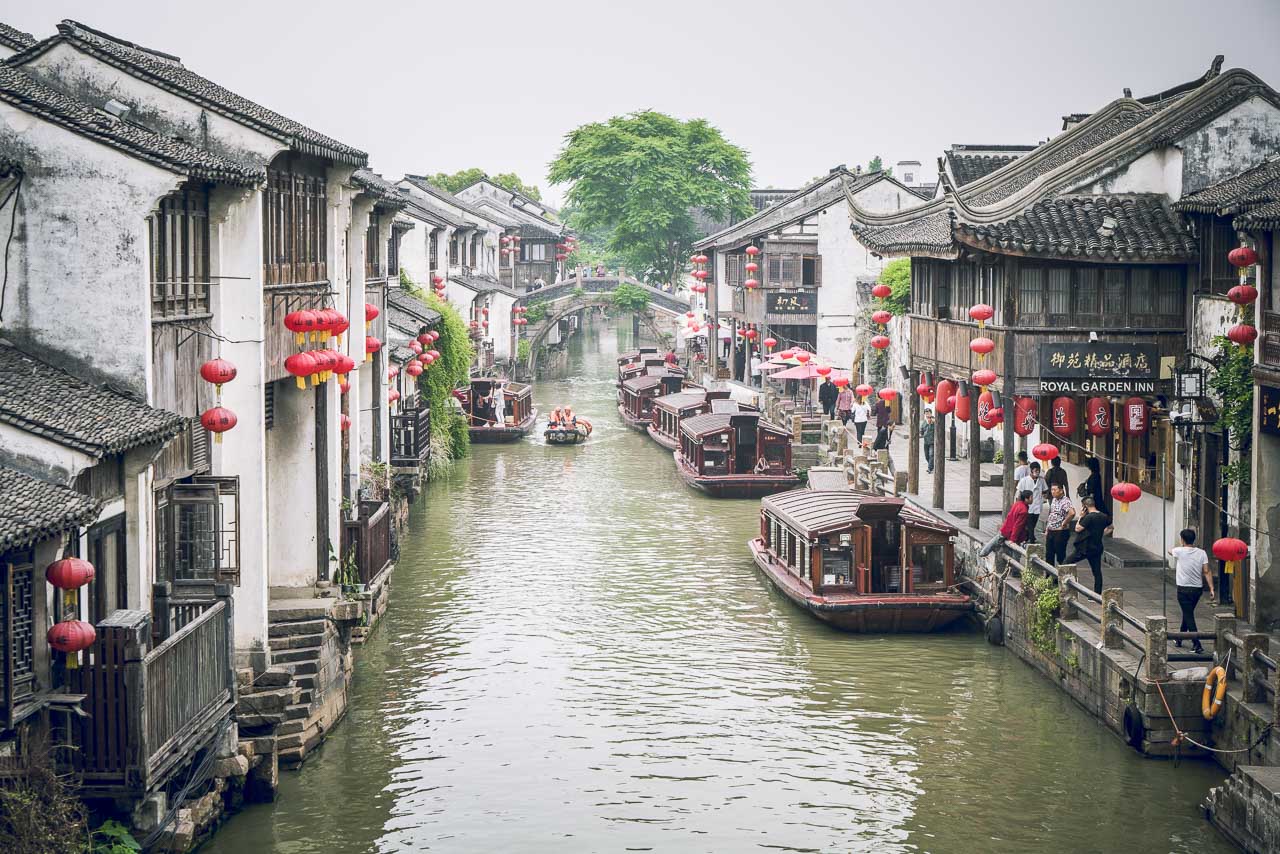
Shantang Street is Suzhou’s famous street. It is an ancient pedestrian path dating back 1200 years. Stone bridges, dating back to the Yuan, Ming, and Qing dynasties, add to the area’s historical and cultural significance. It lines either side of the canal in Suzhou’s old city and stretches from the Shantang River to Tiger Hill.
It is 7 traditional Chinese miles long (2.38 miles) and filled with shops, tea houses, and eateries where tourists can take in the liveliness of the city.
The street has two sections. The tourist section has more boutique-style shops and Western restaurants like Dairy Queen and Starbucks, while the other half in old town has more traditional Chinese shops where locals go about their daily business.
2. Visit the Lingering Garden
The Lingering Garden is a UNESCO World Heritage site, showcasing classical Chinese garden design. Established in 1593, the garden offers insights into the historical and cultural evolution of Chinese gardens. It’s a living museum of horticultural art and history. The garden features exquisite pavilions, corridors, and halls intricately designed and well-preserved. The architecture reflects the Ming Dynasty’s elegance and the Qing Dynasty’s splendor.
Visitors can enjoy serene water features, lush plantings, and artistically arranged rocks, creating a tranquil escape from urban life.
3. Take a Canal Tour
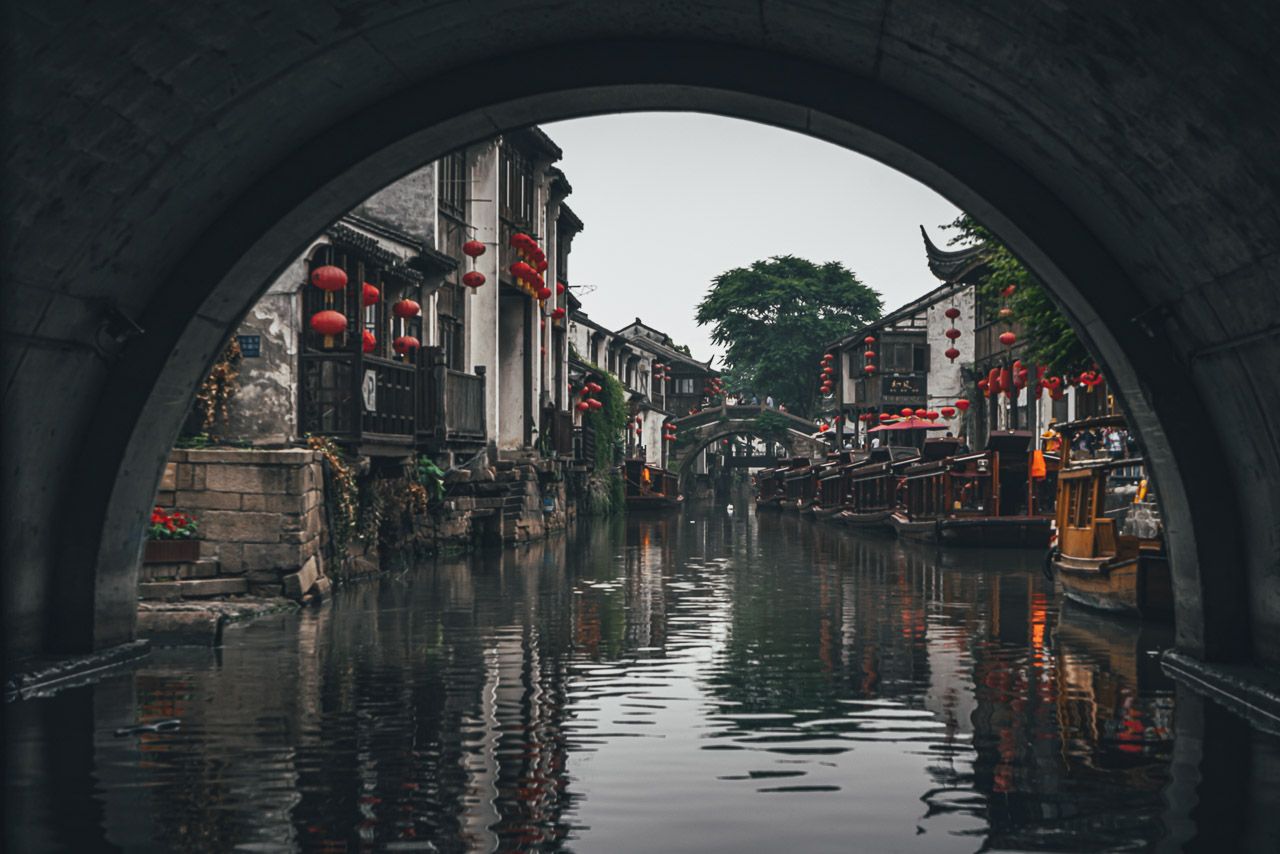
Be sure to take a boat tour along the Canal to sneak a peek at traditional life. It may be prime real estate on the canal, but buildings here cannot be renovated.
They are tiny old homes that must be left as they were, so instead of rich Chinese renovating houses for a weekend retreat, they are left as they always were with basic amenities. Locals live off the river, some without proper kitchens, bathrooms, or laundry facilities. It is a beautiful yet sobering look into how some people live in Suzhou.
4. Walk Along Shantang Street at night
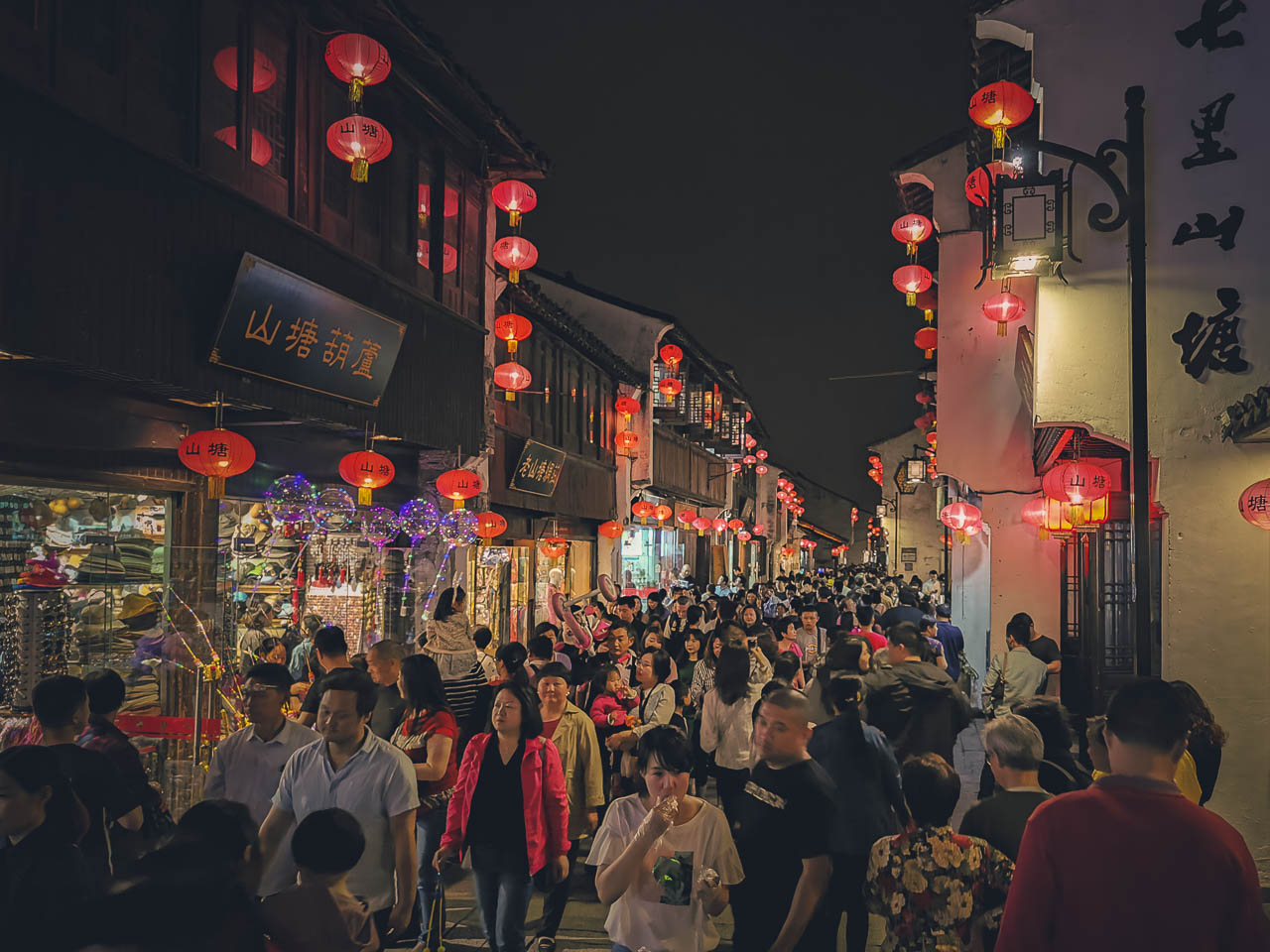
Shantang Street has a completely different vibe at night, and the crowds come out in droves to soak in the energetic atmosphere. It is fun to be in the middle of it all. With the beautiful Chinese lanterns and old architecture, I can see why this is such a popular area at night.
We quickly made our way through the narrow street along the canal to the Chaozong Pavilion, where traditional Suzhou meets modern city.
5. Chaozong Pavilion
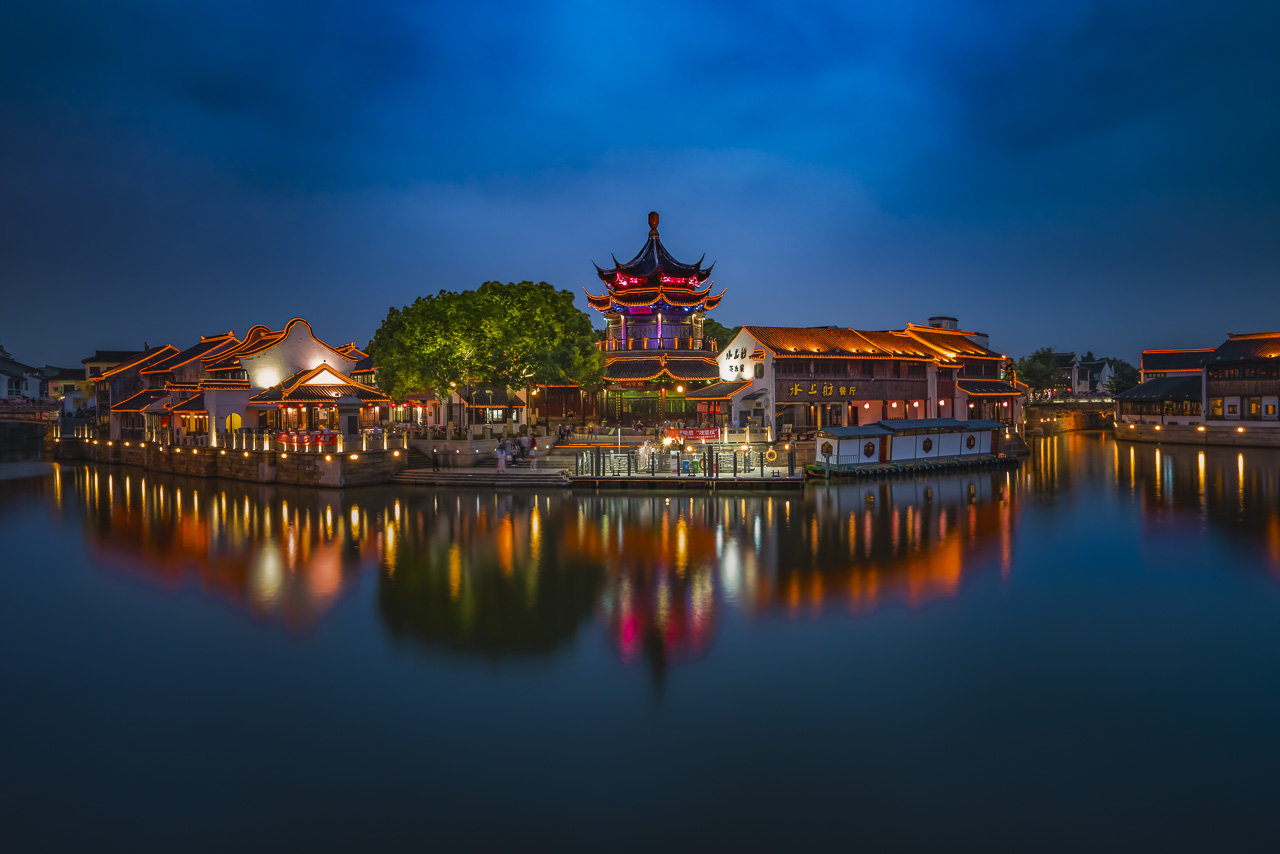
On one side of the canal is the picturesque pagoda, and on the other, a mass of motorcycles lining the sidewalks gather in the massive square filled with fast food, shopping centers, and restaurants.
We were welcomed by the crowd, who seemed more impressed with us being there than we were of the scene before our eyes.
The Chaozong Pavilion in Suzhou is a historic and culturally significant structure located within the city’s classical gardens, renowned for its traditional Chinese landscaping and architecture. It is lit up and looks beautiful at night.
6. Take A Rickshaw Ride
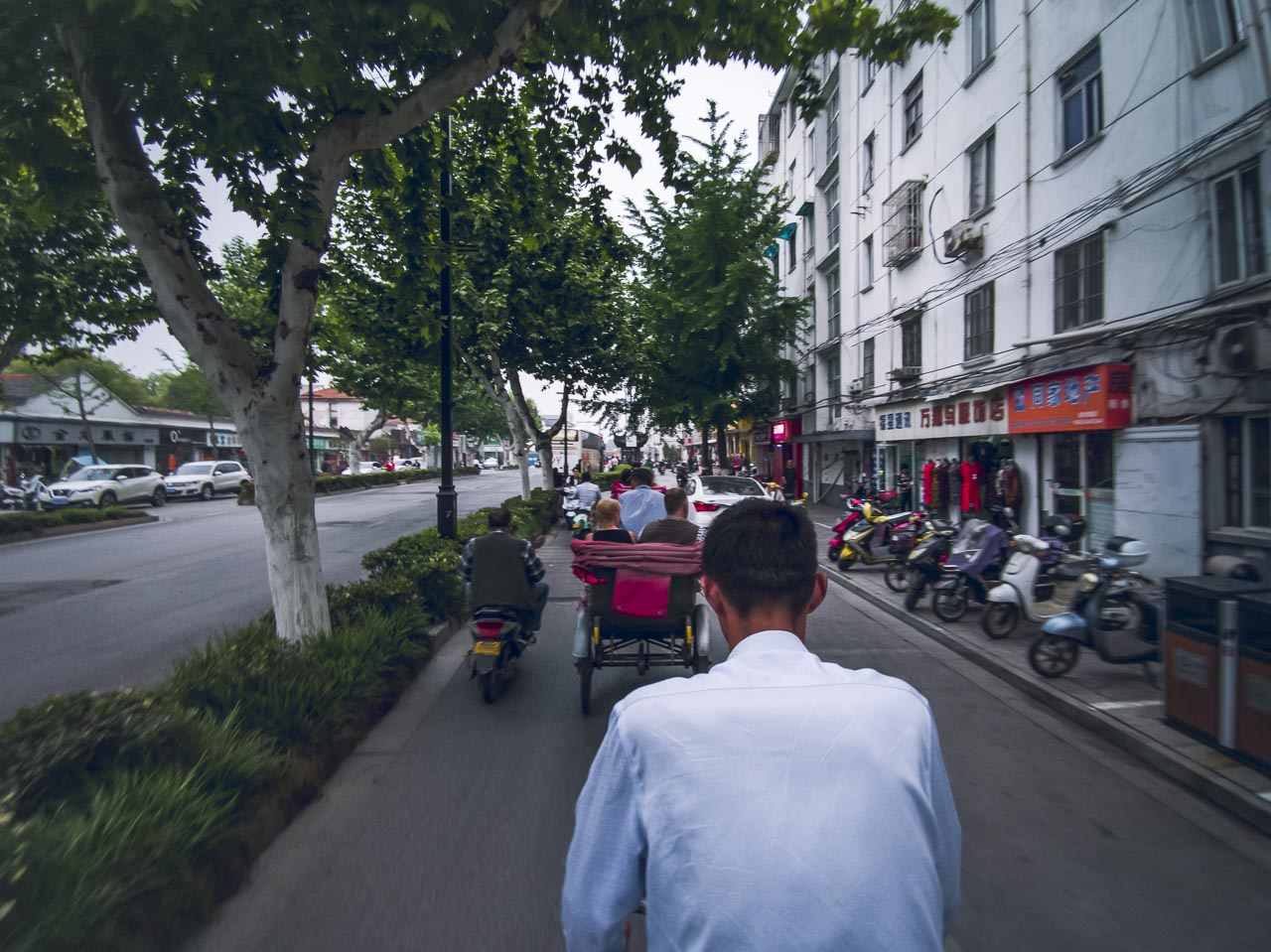
Whenever we visit China, we must take a rickshaw ride. When we visited Suzhou, the rickshaws took us through the quiet back streets and pathways lining the canals.
We stopped at a traditional Chinese market to view produce and some very interesting dining choices. It is not for the faint of heart as live frogs and turtles sit in mesh plastic awaiting their fate.
But as we always say, “At least in Asia, they know where their food is coming from, unlike the West where we pack our meat neatly in styrofoam and plastic wrap, pretending that it never lived in the first place.”
The tour ended at dusk at another famous street in Suzhou, Pingjiang Road.
7. Pingjiang Road
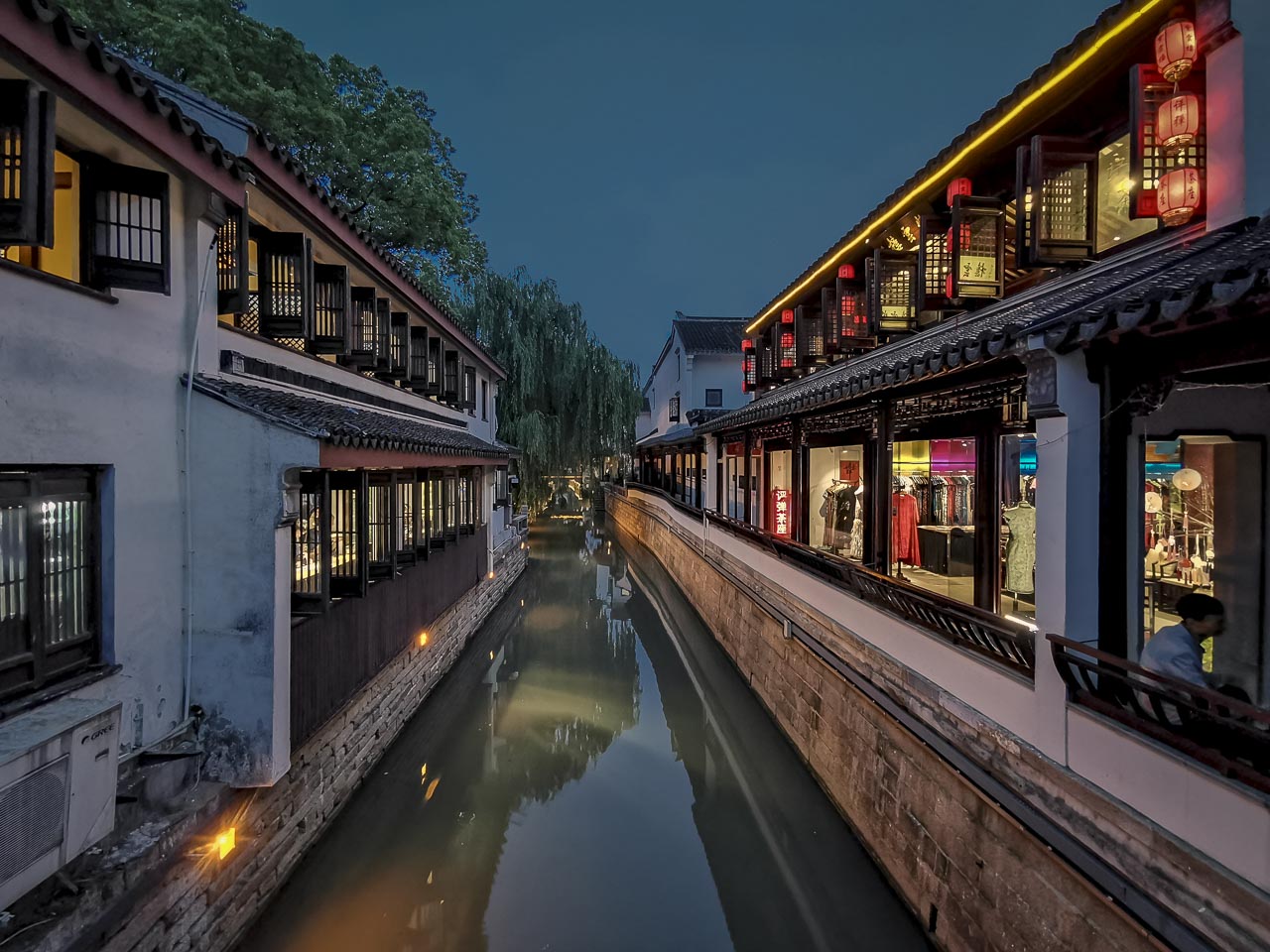
Similar to Shantang Street, Pingjang Road is a pedestrian street spanning along the canal. It is filled with street vendors, cafes, souvenir shops, and plenty of crowds.
There are photo opportunities along the canal as the street lights up for the night. I love China at night. The cities were truly designed for the dark, with lanterns and neon lights decorating the night sky.
8. Attend the Chinese Kun Opera
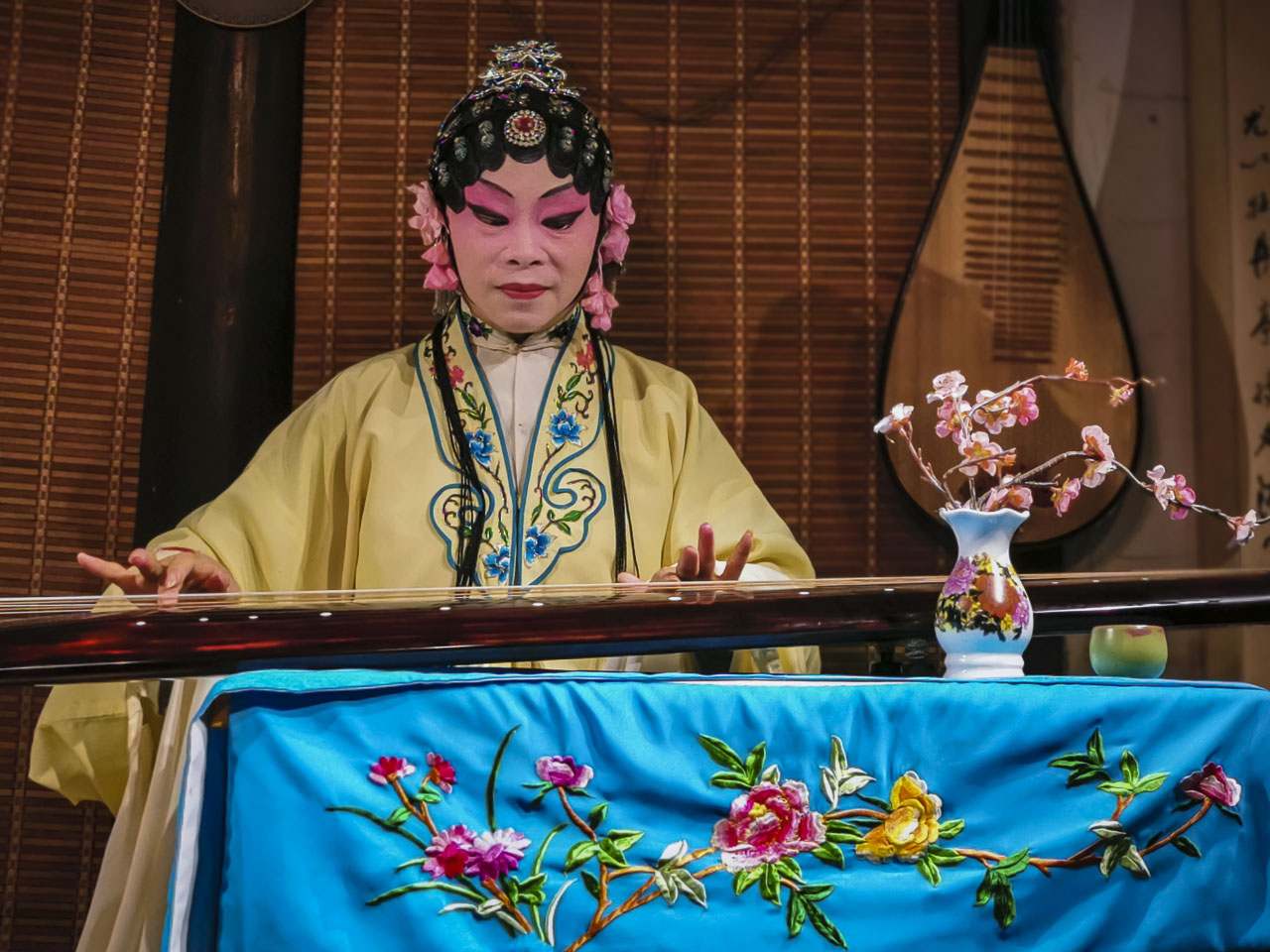
I don’t know if I would recommend seeing an entire Chinese opera, but going to a small house in Pingjian Road to watch an opera performer apply her makeup, followed by a show is a must!
The Fuxi Tea House on Pingjiang Road gives visitors the unique experience of witnessing the transformation before their eyes. We sat down in a dim restaurant to watch an artist pull her face to extreme limits while painting her face to look like a painting.
She told us how the makeup was applied and how opera performers usually have people help them, and it can take up to an hour and a half to finish the work.
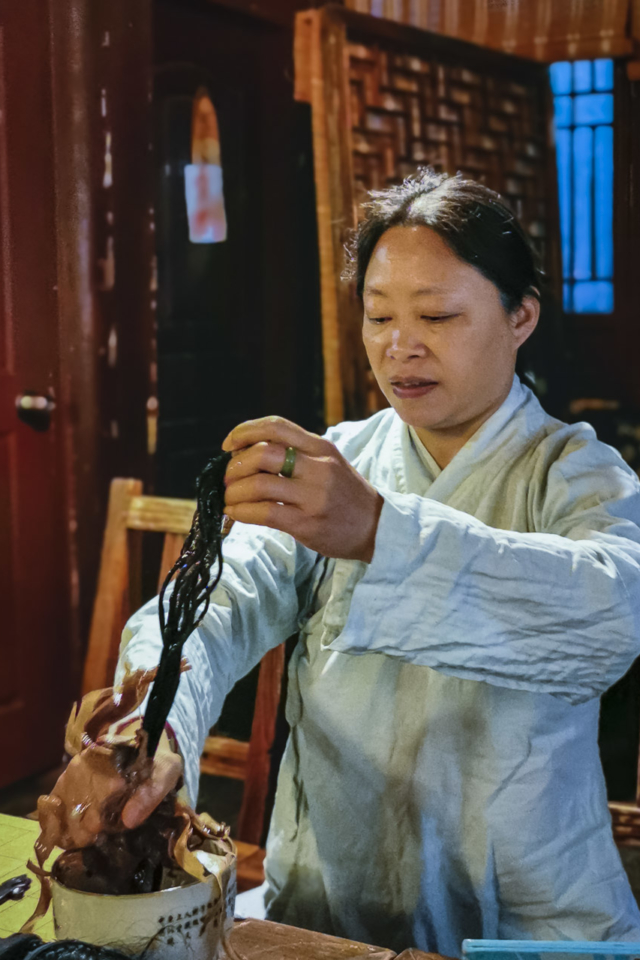
She has mastered her craft and managed to finish her transformation in 30 minutes! Her face was pulled so tight that she said (through our translator) that many new performers pass out from the pain.
After she finished, she put on a show for a packed hall, and although we couldn’t understand a word she was saying, we felt the fun and delight the crowd was having. (we assume at our expense as the only foreigners in the building:)
9. Humble Administrator’s Garden
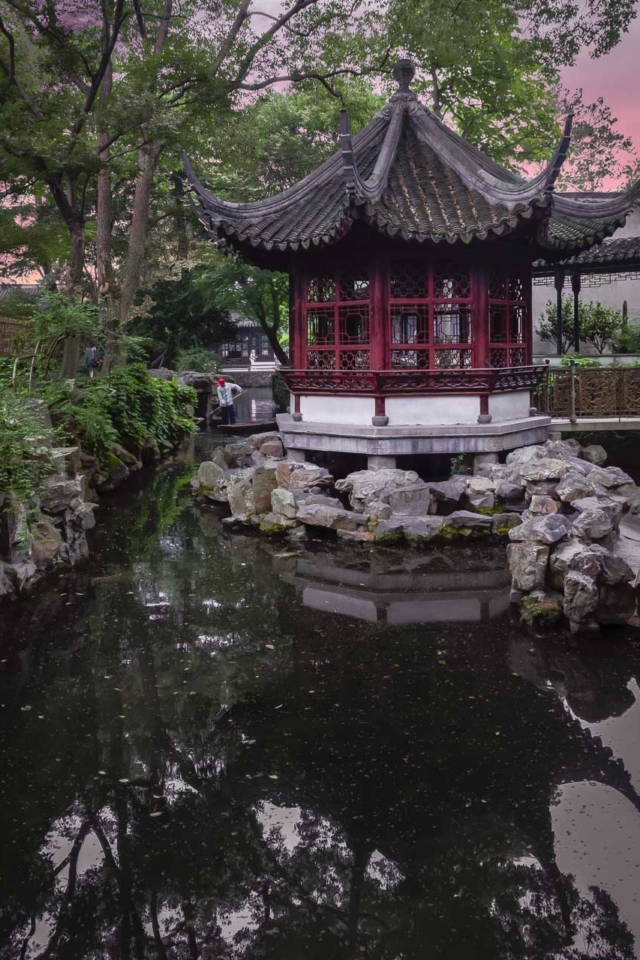
Suzhou has 69 classical Chinese gardens, and nine of the greatest are designated together as a UNESCO World Heritage Site. These exquisite gardens are a highlight of any visit to Suzhou, showcasing the beauty and allure of the region.
The Humble Administrator’s Garden is the most famous of all the gardens. Dating back 500 years, it is one of the four famous gardens of China.
Unlike the Summer Palace or Forbidden City Garden’s of Beijing that were imperial gardens used by royalty, the Humble Administrator’s Garden was owned by a private family.
This garden truly shows the wealth and prosperity of China’s elite.
Since it is so popular, it gets very busy very quickly. We arrived first thing in the morning and beat the crowds, but by 9:00 am, it was swarming with people.
10. Lion Grove Garden
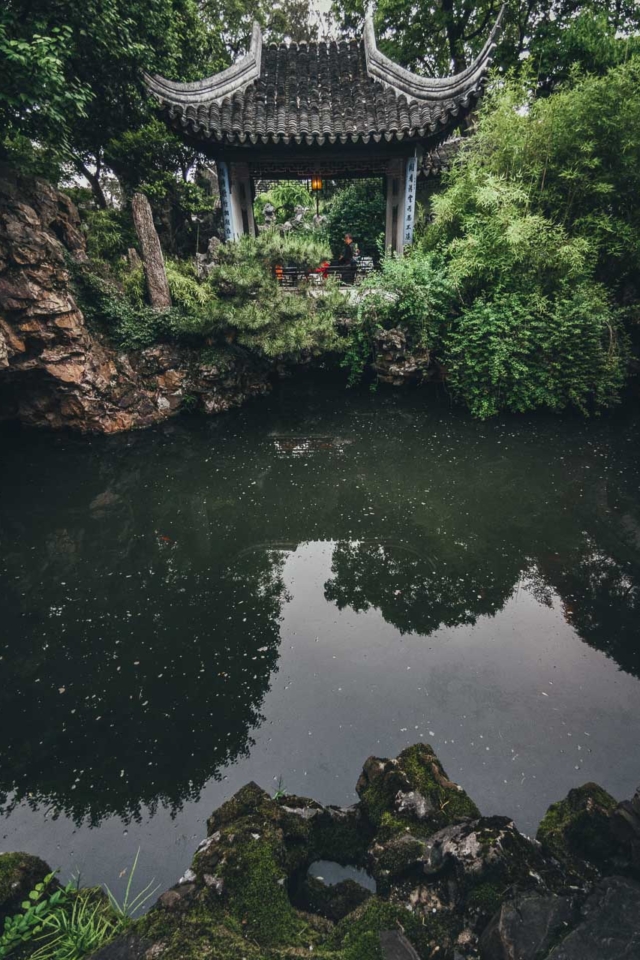
Not too far away was the smaller yet, in my opinion, more impressive Lion Grove Gardens.
Built-in 1342 during the Yuan Dynasty, Lion Grove Gardens was named after the rocks that resembled that of a lion.
What sets this garden apart is the multilevel rock formations known as rockeries that weave through waterways creating pathways up, over and through decorative rocks made of limestone from Taihu Lake.
We got lost in a maze of rocks designed to create a relaxing atmosphere of serenity and contemplation. Today, the crowds diminish the serenity, but they cannot detract from the beauty of the gardens. It is truly a work of art.
11. Panmen Scenic Area
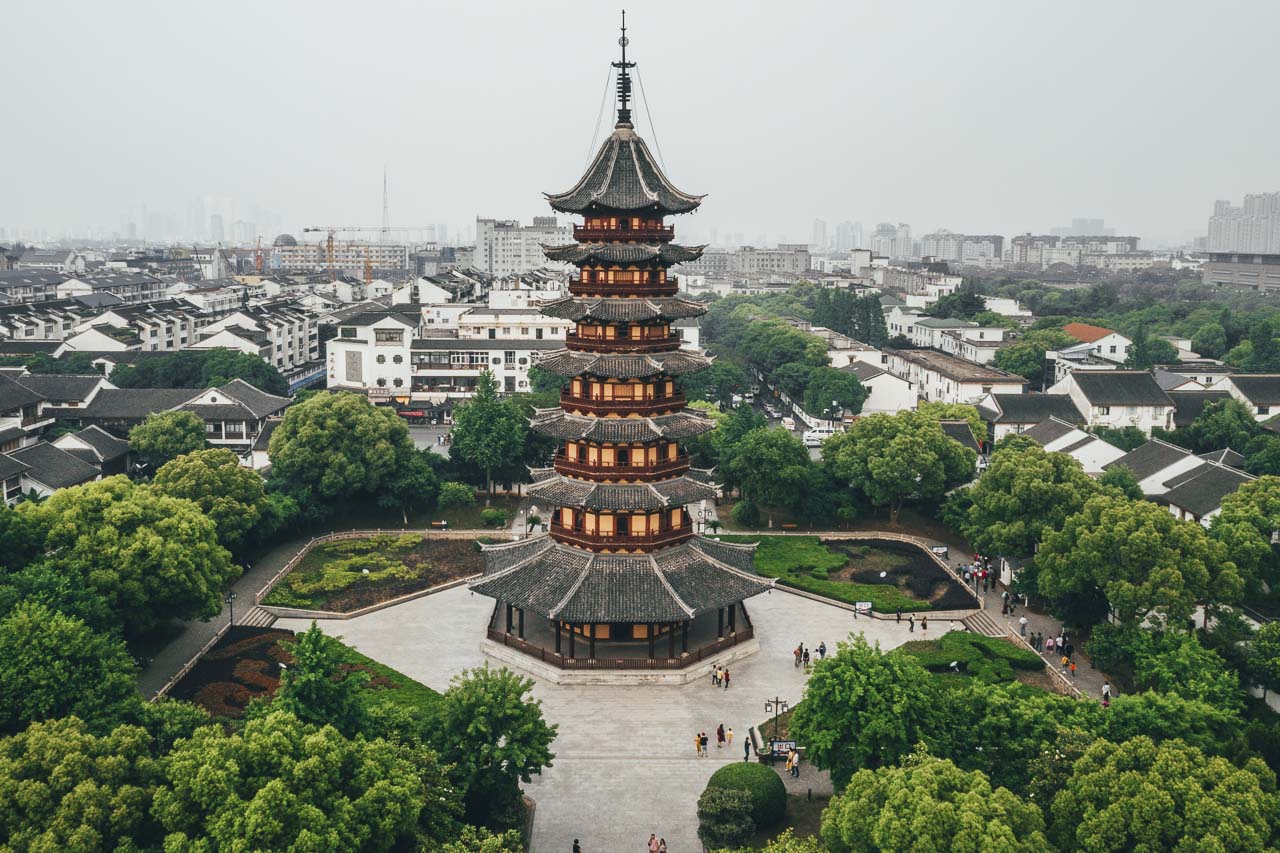
Another garden that we enjoyed visiting was the Panman Gardens. Connected to our hotel accommodations, the Pan Pacific Hotel, it gave us the opportunity to stroll the grounds without crowds during the off hours.
It is a large area housing pagodas, lakes, gardens, and bridges. The garden leads out to the incredible Grand Canal.
12. Panmen City Gate
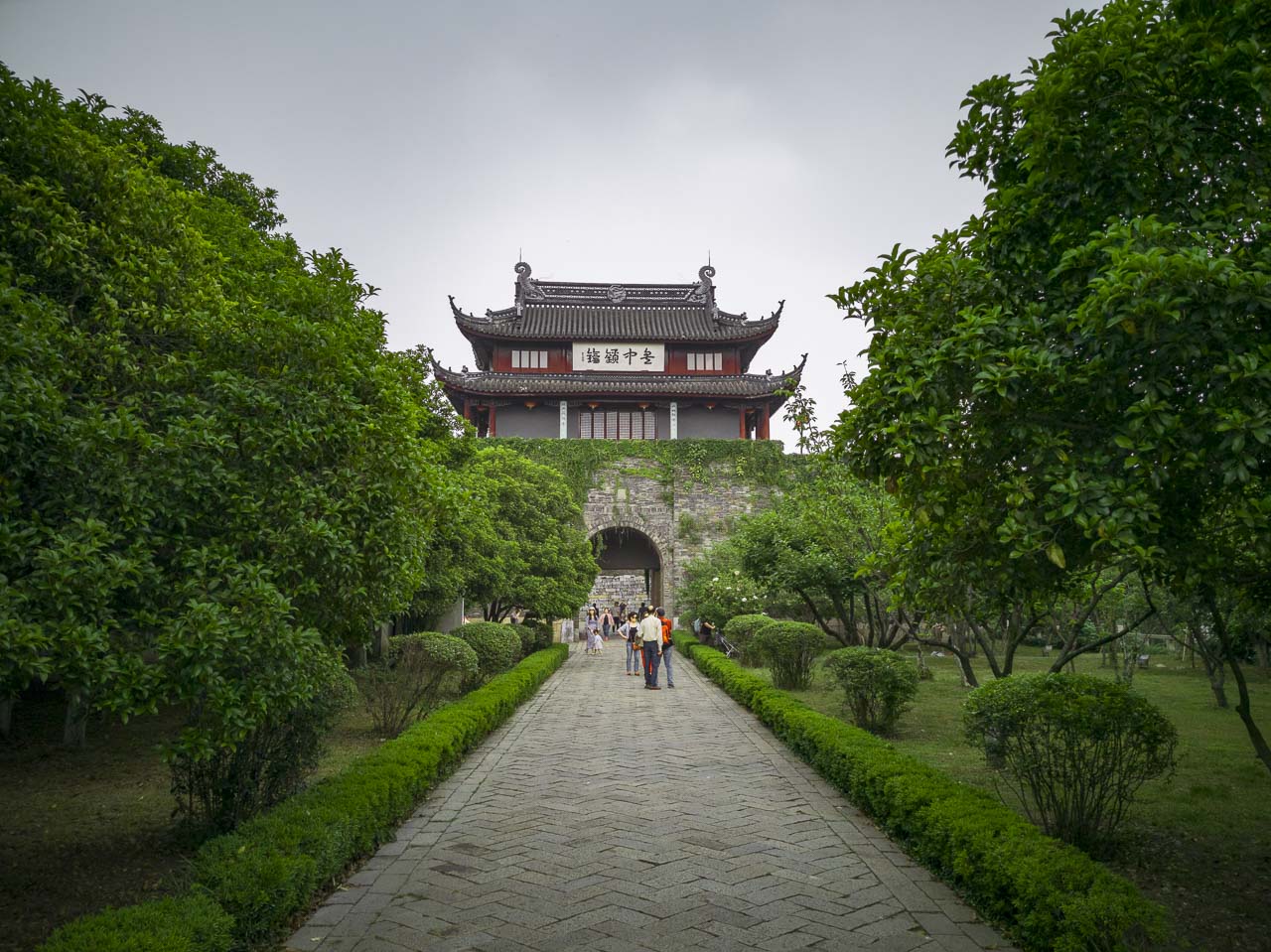
The Panman Gate is located here on the Suzhou Grand Canal, and visitors can enter here crossing through the historic structure dating back 2500 years. It has the distinction of being the only preserved water and land city gate in the world.
Attached to the Old City Wall, it is possible to walk along the 300 meters (328 yards) that are still intact, standing 5 meters (16 feet) high, offering panoramic views.
13. Boat Trip on Grand Canal
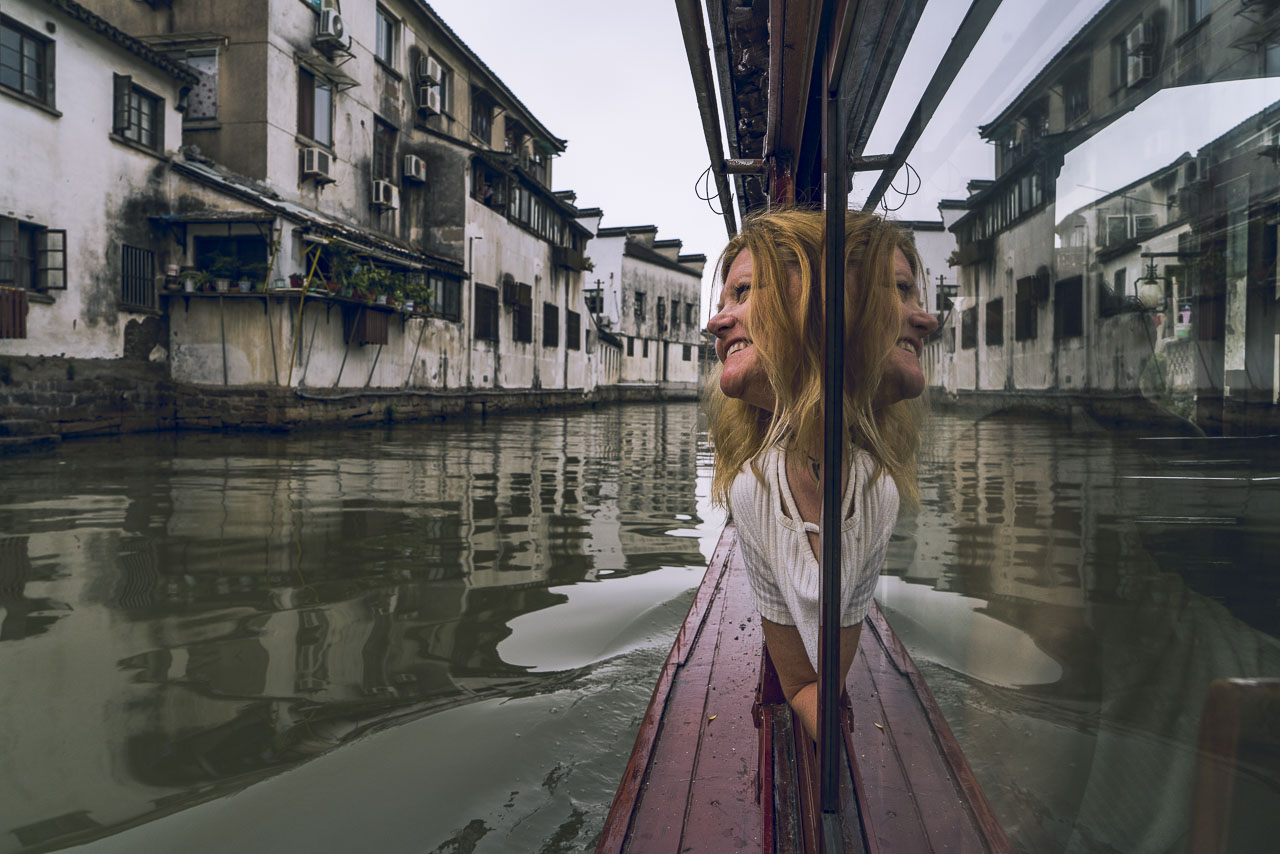
We took a walk through the Panmen Gardens to the Grand Canal, where we hopped aboard a canal tour to take in the sights along the water. The Grand Canal is a must-stop as it is part of the longest and oldest man-made waterway in the world.
Known as the Golden Waterway, Construction began on the Grand Canal in 770 BC. It spans an astounding 1776 km from Beijing to Hangzhou. You can take a night cruise to watch sunset, and enjoy the beauty of the city at your leisure.
14. Try Squirrel Mandarin Fish
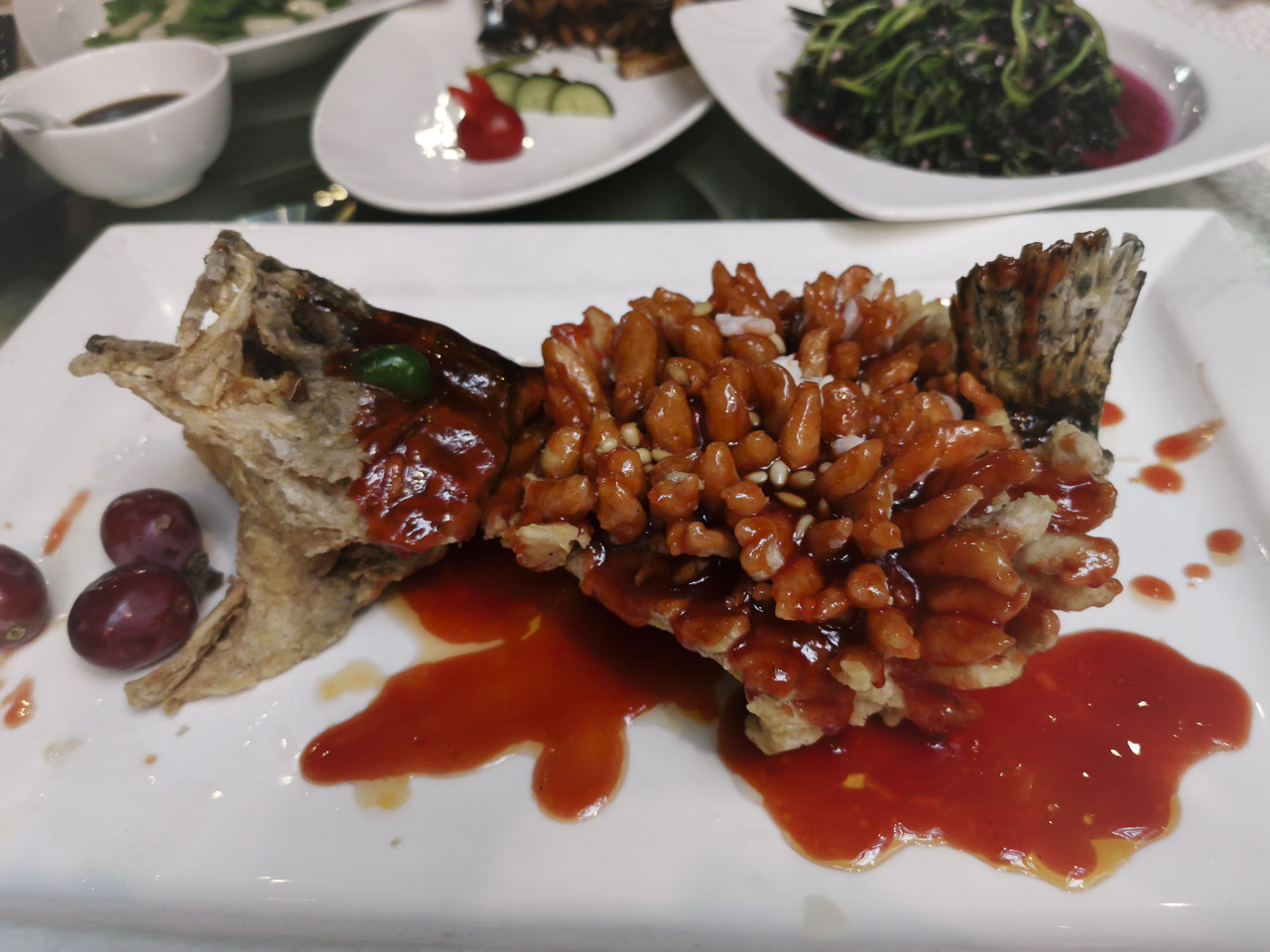
It was here on Shantang Street that we sampled Suzhou’s famous fish dish, Squirrel Mandarin Fish. Song He Lou has been serving traditional food for more than 250 years.
Squirrel Mandarin Fish (Song Shu Gui Yu) is a classic Suzhou dish famous for its craftsmanship and beauty. A fresh Mandarin fish is scored to create a crisscross pattern, then deep-fried to a crispy golden brown, hence the name Squirrel Mandarin Fish. The crispy fish is then covered in a sweet and sour sauce made from ketchup, vinegar, sugar, and soy sauce and garnished with green onions. A balance of flavors and textures, Squirrel Mandarin Fish is a festive and beautiful dish that symbolizes prosperity and good luck, a must try in Suzhou.
We ate a feast of fresh, family-style Chinese food, such as Suzhou sweet and sour mandarin fish, stir-fried shrimp, and vegetables.
15. Pan Pacific Hotel
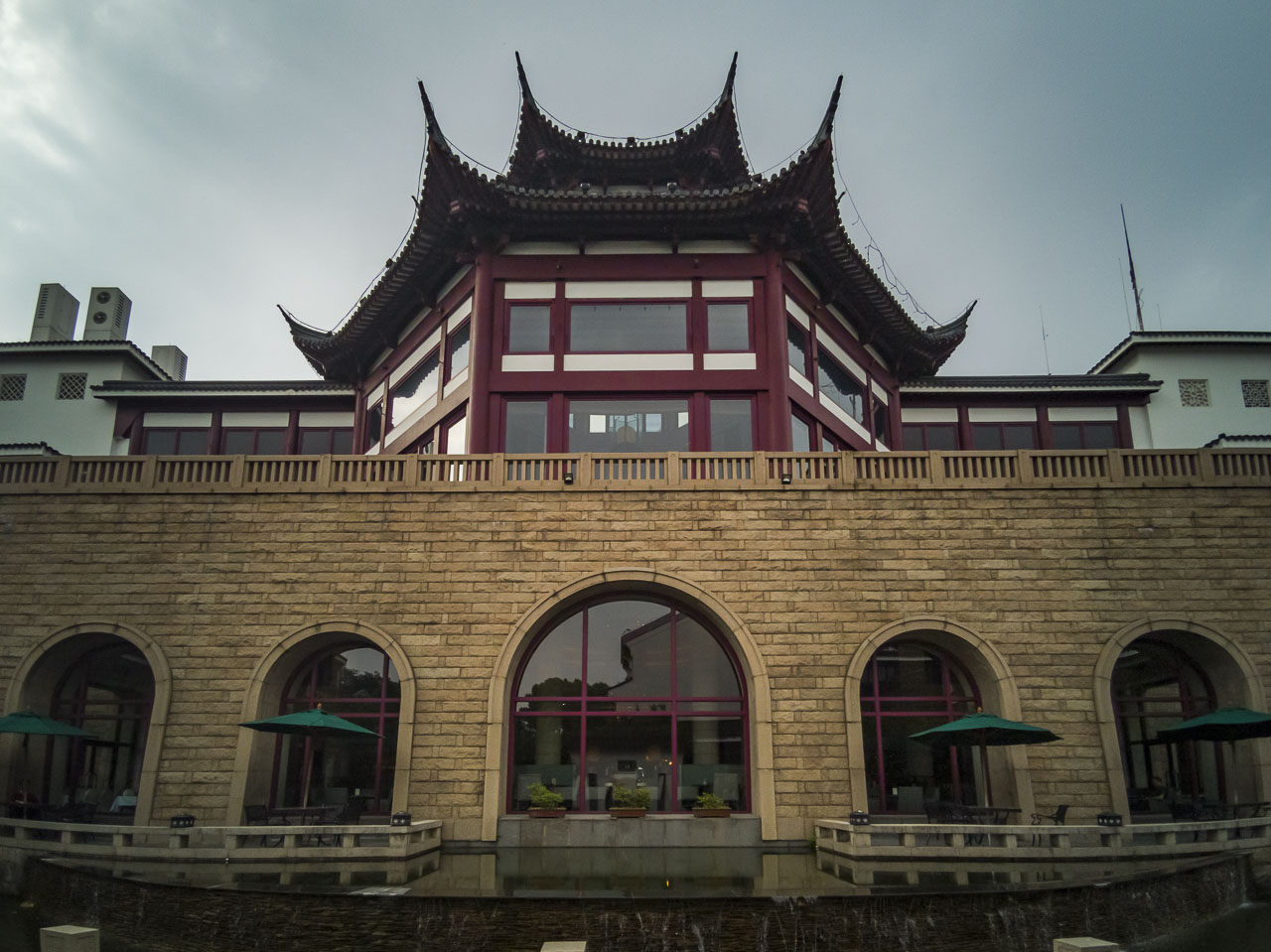
While we are here, we must talk about our accommodation, the Suzhou Pan Pacific Hotel. This is a destination unto itself. Connected to the Panmen Gardens, the Pan Pacific feels like you are staying in a traditional Chinese Palace. Modeled after the Forbidden City, it looks like a temple with impressive gardens of its own.
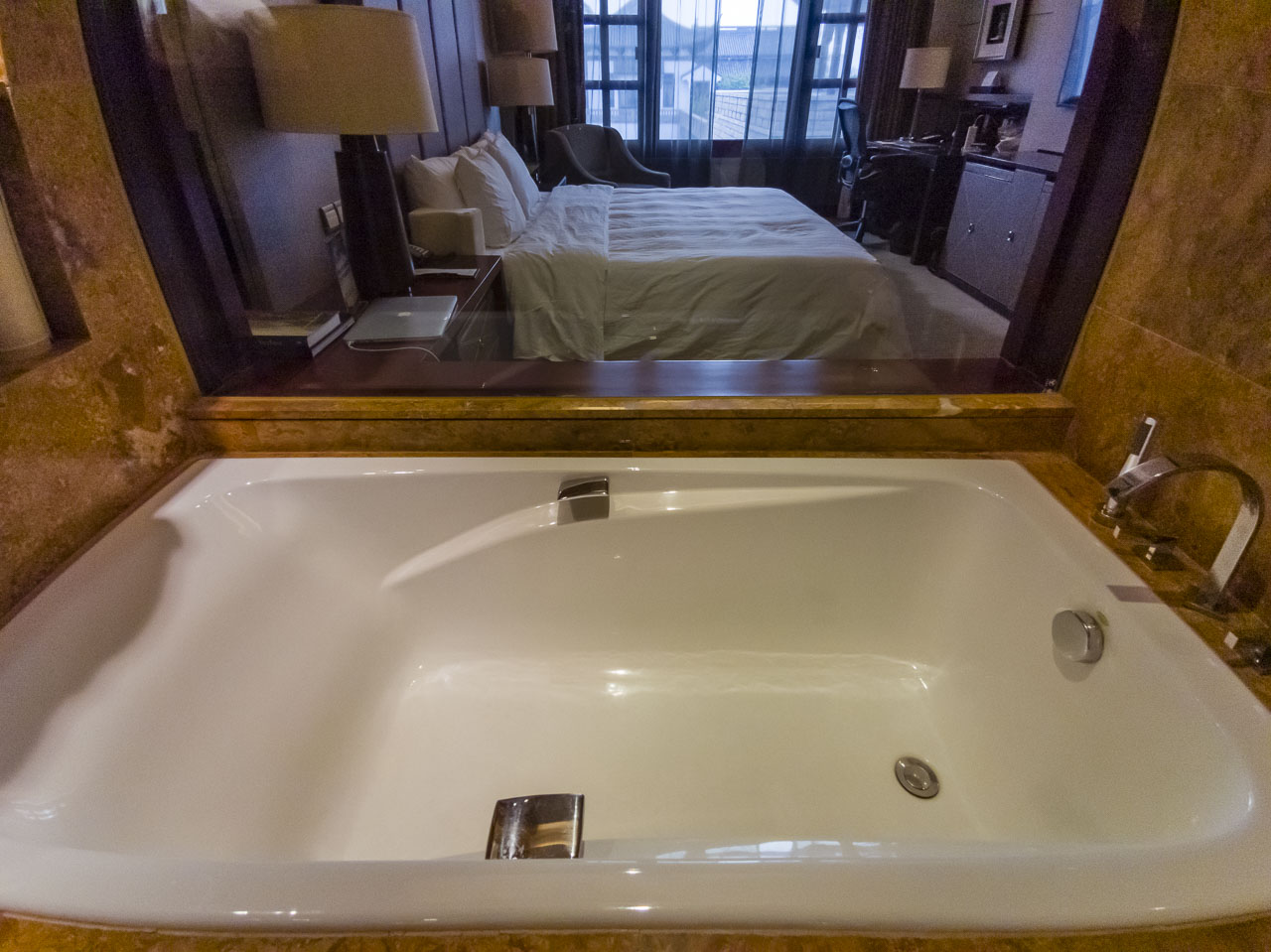
16. W Hotel for Water Light Show
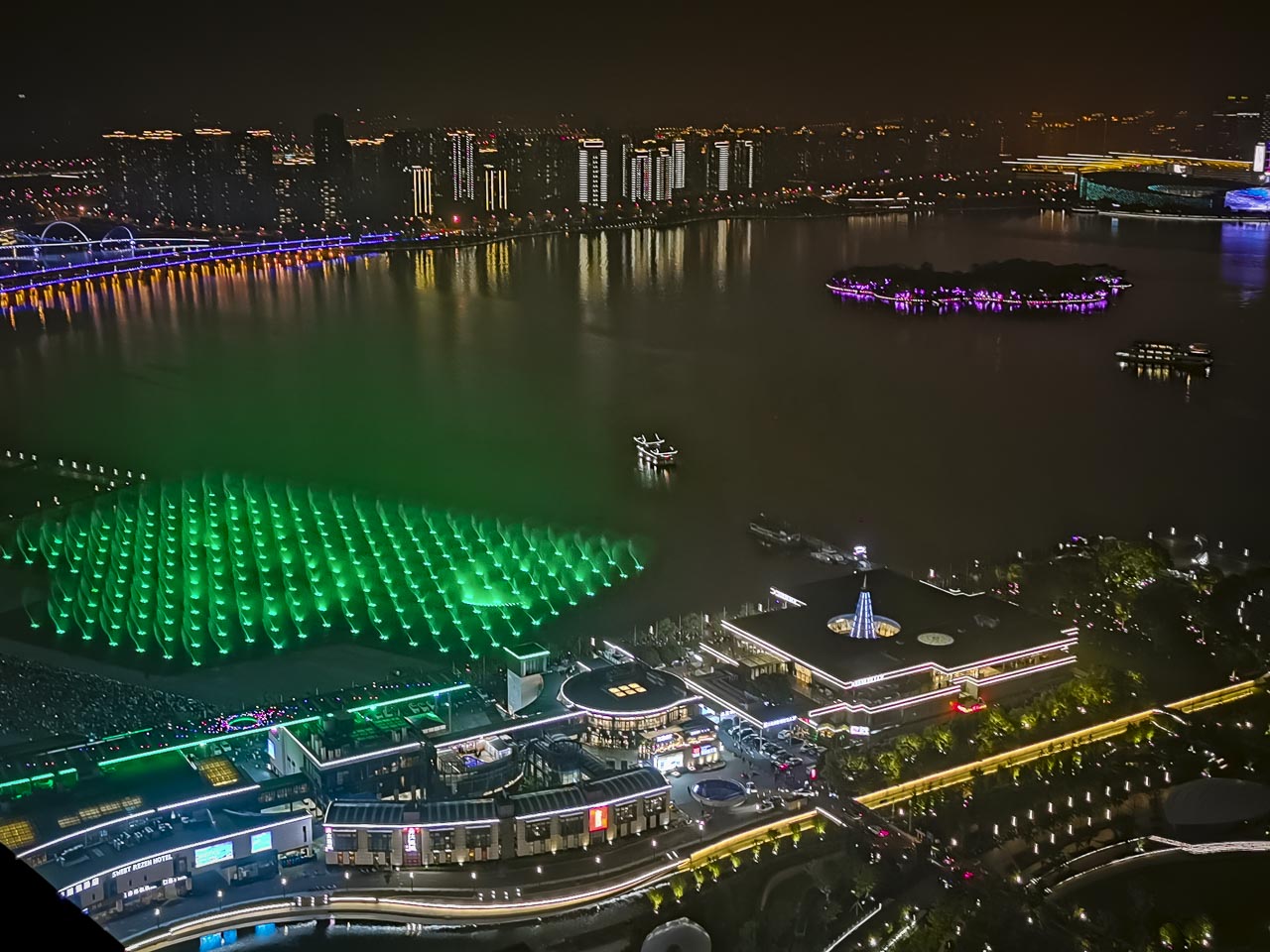
Like most cities in China, Suzhou has a fantastic modern skyline, and seeing it at night is a must.
China really comes alive when the sun goes down and on Friday and Saturday nights (days vary by season) it puts on a light and fountain show similar to the Bellagio in Vegas and the Dubai Fountain Show at the Burj Khalifa Lake.
We went to the top of the W Hotel, where it is, apparently, it is the best view. If you really want to see the show, I suggest getting to the waterfront early and watching it from below, but this was a good consolation.
The view of the show itself was a bit obstructed, so we had to maneuver our way around hanging cameras over the edge, but it was worth it. The atmosphere on the W rooftop is elegant, and the views of the city and lake are gorgeous.
17. Walk Along the Waterfront
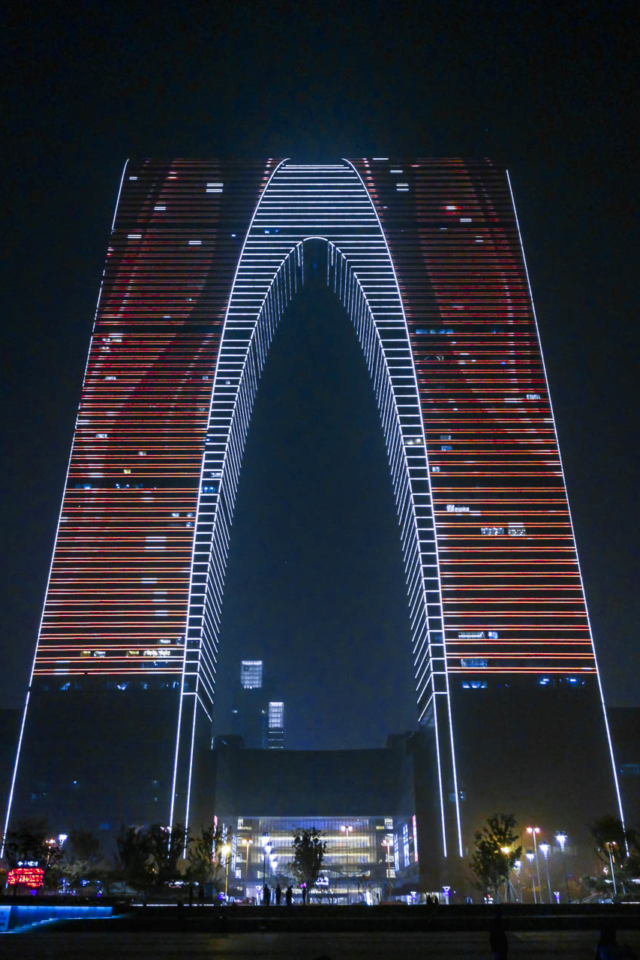
After the show, take a walk along the waterfront to see the light show (until 10 pm) portrayed on the magnificent building The Gate of the Orient.
This skyscraper looks like a pair of trousers and is the perfect backdrop for a light spectacle displayed on the face of the building.
If you are down on the waterfront during the fountain show, you’ll see the pictures displayed on the building, but if you are up in the W Hotel like we were, you will have to wait until after the show to view the scene.
It’s worth seeing for sure!
18. Go Shopping at Suzhou Industrial Park
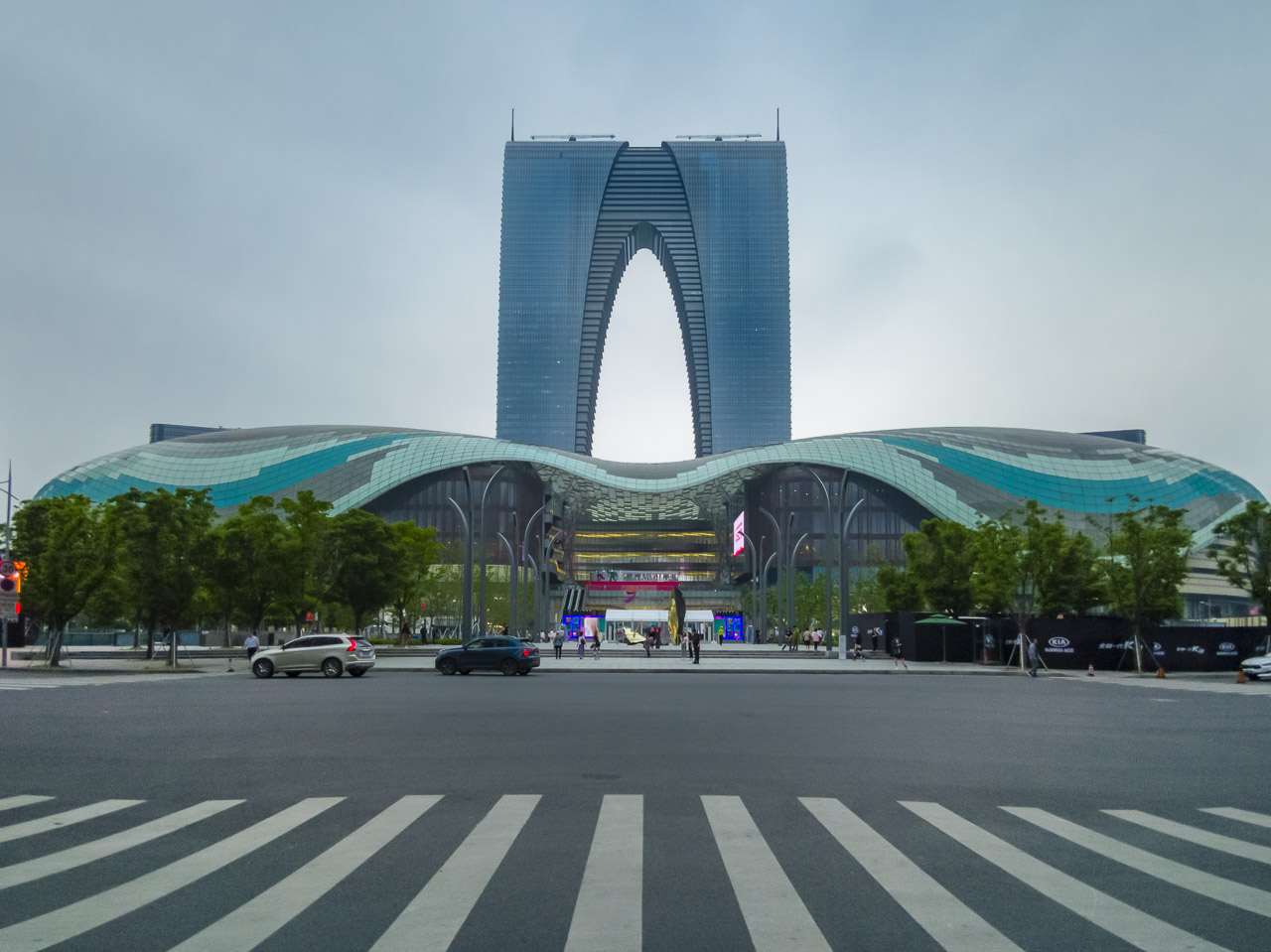
Suzhou Centre Mall is a massive shopping center complete with a skating rink, snowboard park, pony riding arena, and a carousel. This is a mall that rivals the malls of Dubai, and it’s a fantastic place to go shopping.
It is such an impressive mall that it even won the award of Best New Shopping Centre” at MAPIC Awards 2018 in Cannes, France.
19. Suzhou Museum
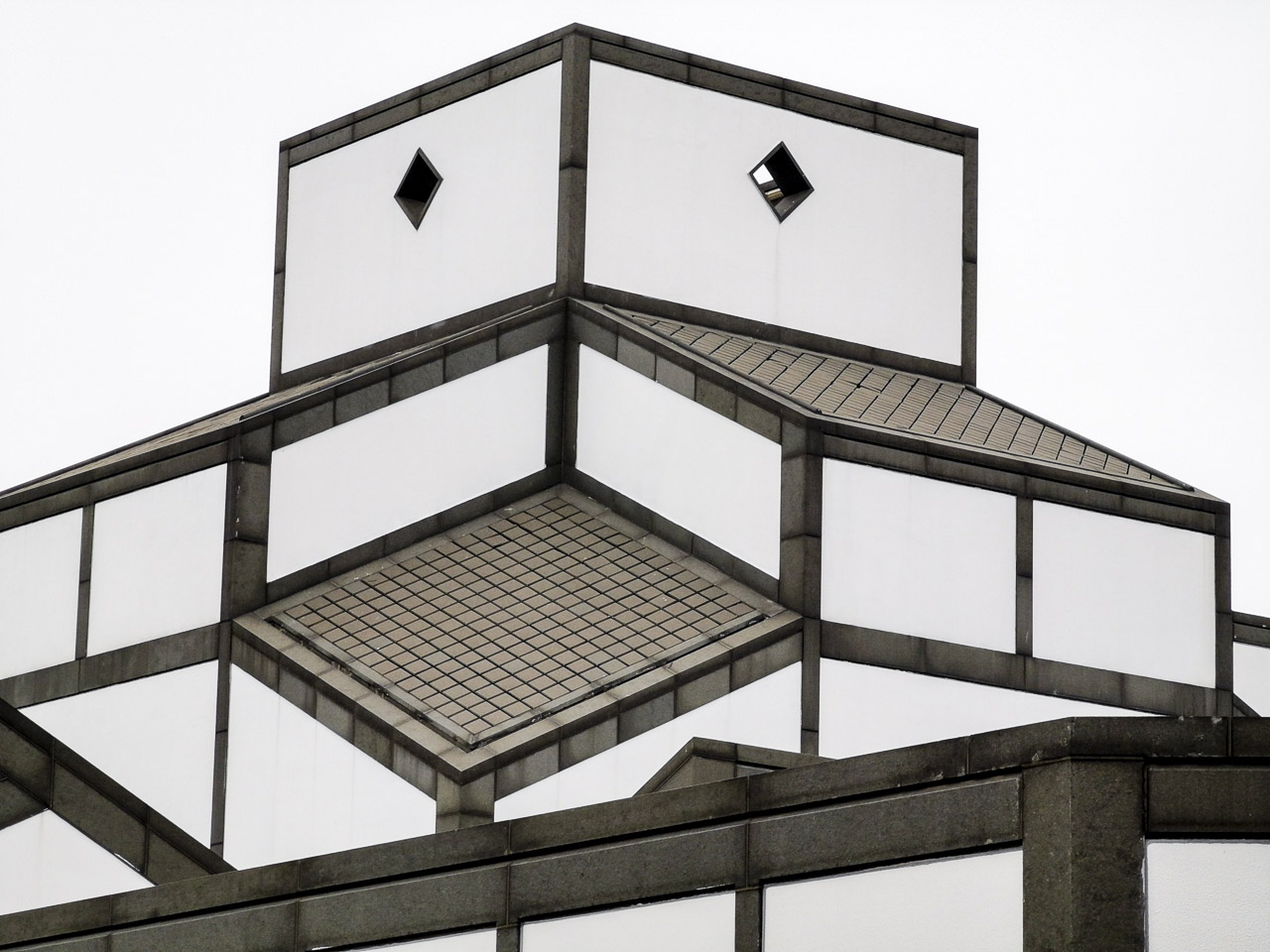
During our time in Suzhou, we were fascinated to find out that IM Pei grew up near here. Tiger Hill, a significant site in Suzhou, dates back to the spring and autumn period (770 – 476 BC), adding to the cultural and historical richness of the destination.
During the day of our visit to the Suzhou Museum, which he designed, we found out that he had just died.
It was a very strange feeling to stand in front of one of his great architectural designs and learn of his childhood home while simultaneously learning that he had passed away. Suzhou was the traditional retreat of his family, and they owned one of the gardens in the city. It is only fitting that he designed a work of art in a place that gave him such inspiration.
IM Pei designed The Louvre pyramids, the Bank of China Hong Kong Tower and many other famous buildings around the world.
20. Tiger Hill Scenic Area – Leaning Tower
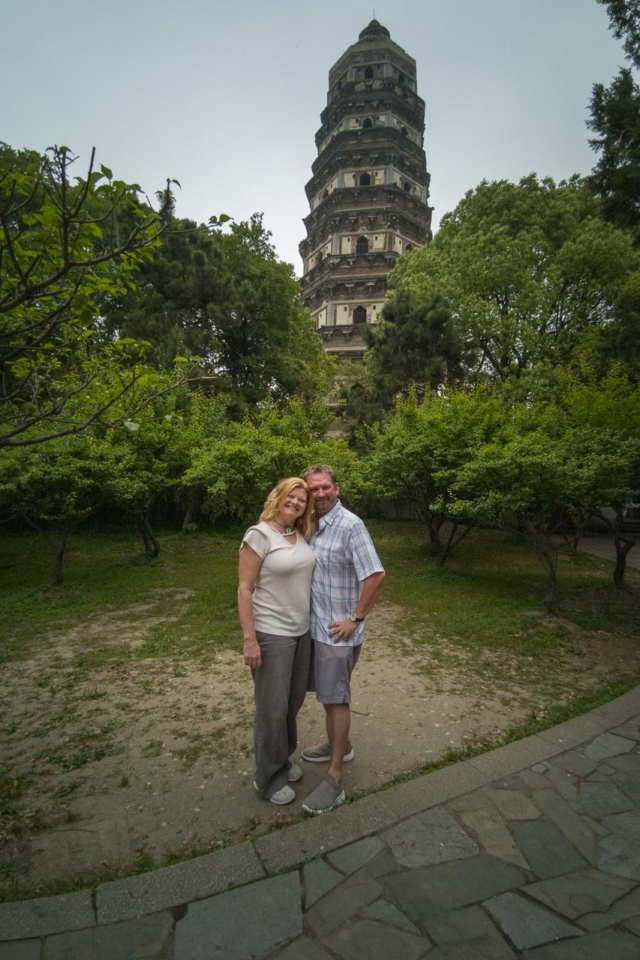
Built during the Song Dynasty (960-1279), Tiger Hill has become the unofficial symbol of Suzhou and is a popular tourist attraction.
Thinking we’d have to climb to the top, we were surprised to hop on a golf cart that brought us right to the entrance of the Tiger Hill Pagoda. We love how efficient the Chinese are. Tiger Hill Pagoda is the oldest pagoda in Suzhou and it is unique in the fact that it is leaning.
Yes, we’ve all heard of the leaning tower of Pisa, but the Tiger Hill Pagoda has an impressive lean of 5 degrees and when standing below the 158 foot (48 metres) tower you feel as if it may fall over at any second.
There are many sights to see in the 3.5-acre complex, including the sword pool, where it is believed that King He Lu was buried with his collection of swords below the water,
21. Bonsai tree session
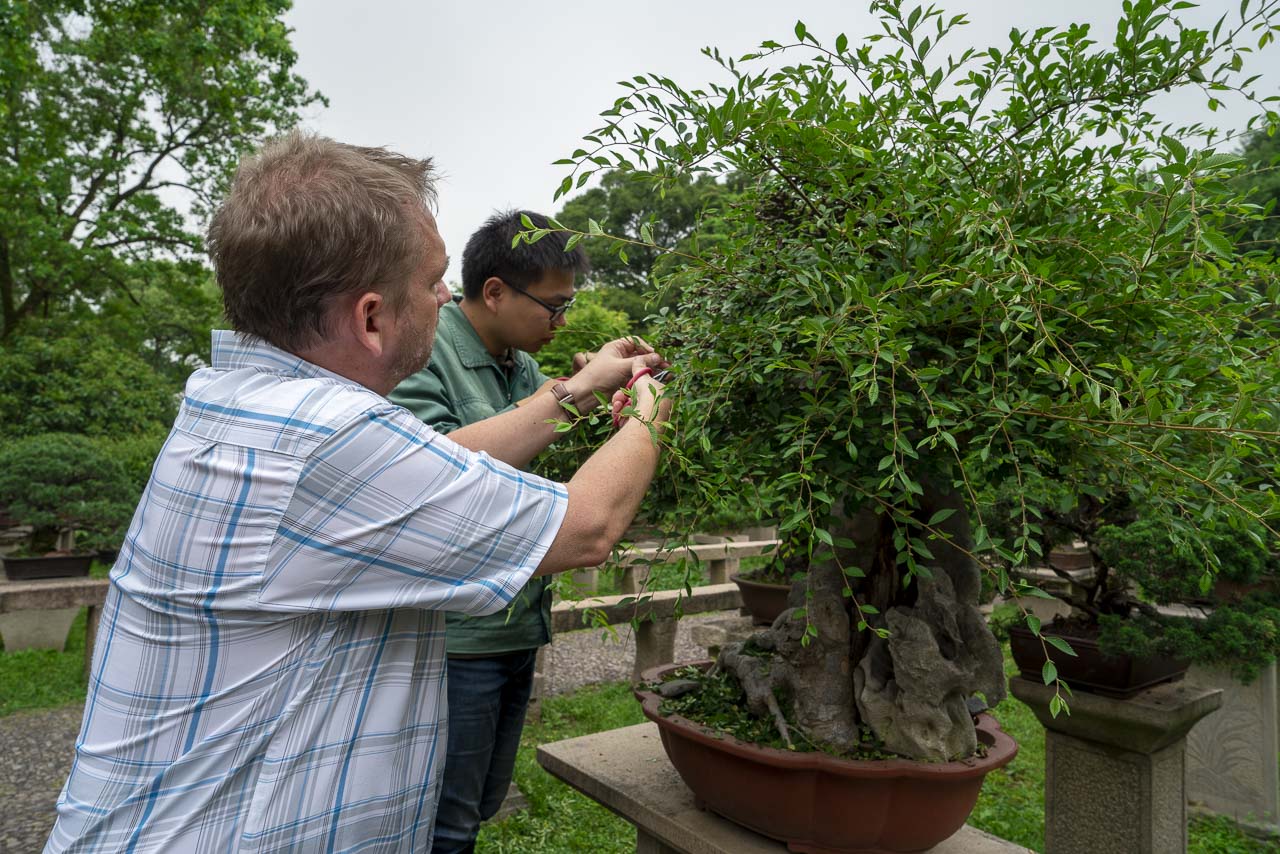
Bonsai masters are revered in Suzhou, and we witnessed an impressive collection of Bonsai Trees at Tiger Hill. We met with a Bonsai master who taught us how to prune bonsai trees properly.
Trying our hand at a mature tree, my hands shook as I worried I might slip and ruin a masterpiece. But it all turned out, and we learned that to prune a tree properly, you must cut where the branch splits in 3 so that you can control which way the leaves grow.
Before leaving the area, be sure to check out the 400-year-old bonsai that is protected by a fence and only cut by the Bonsai master.
22. Master Yang Tai Chi
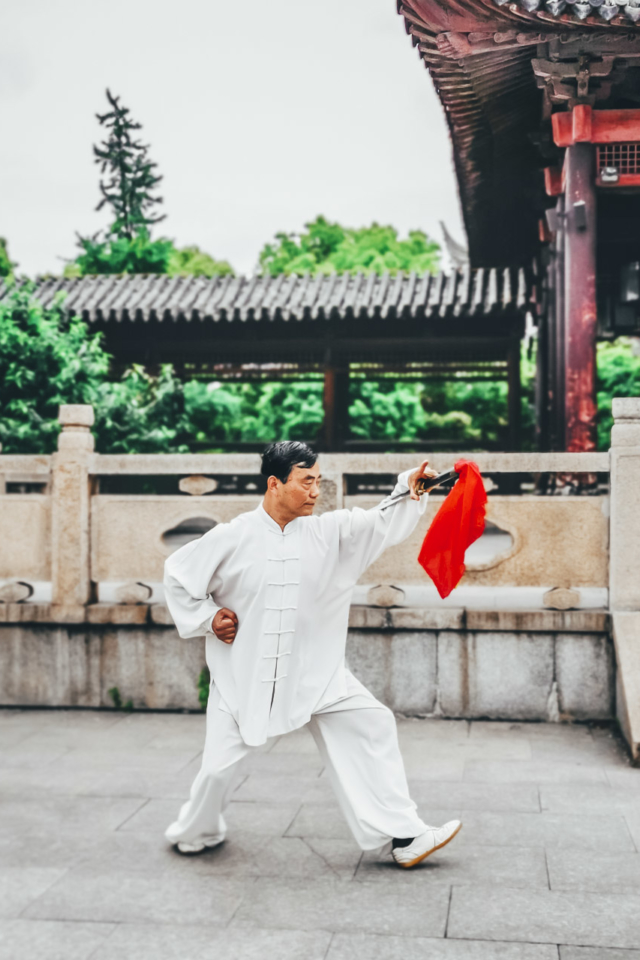
China is the birthplace of Tai Chi, and it seems that whenever we go there, we take a class. I don’t know why we don’t take up Tai Chi when we are at home; it is relaxing and has many benefits.
As our muscles and bones ache, we keep telling ourselves to immerse ourselves in Tai Chi in the future. Suzhou Garden, known for its beauty and historical significance, is another must-visit attraction in the area. But it’s hard to top a lesson with Master Yang. He is a Tai Chi Champion in China and Hong Kong.
We met him at the Pan Men gardens for an early Tai Chi class and marveled at his skills with a sword as he demonstrated what is possible with this martial art.
- If you want to book a class, ask your guide or concierge to phone Master Yang. Everyone knows him, he’s famous!
What started out as a quiet and serene morning quickly turned to a lively performance as local Chinese citizens stopped by to watch us try our hand at their traditional art.
They took our photos, and some even joined in. It was a festive event that brought everyone together, and we loved every moment.
23. Tongli Water Town
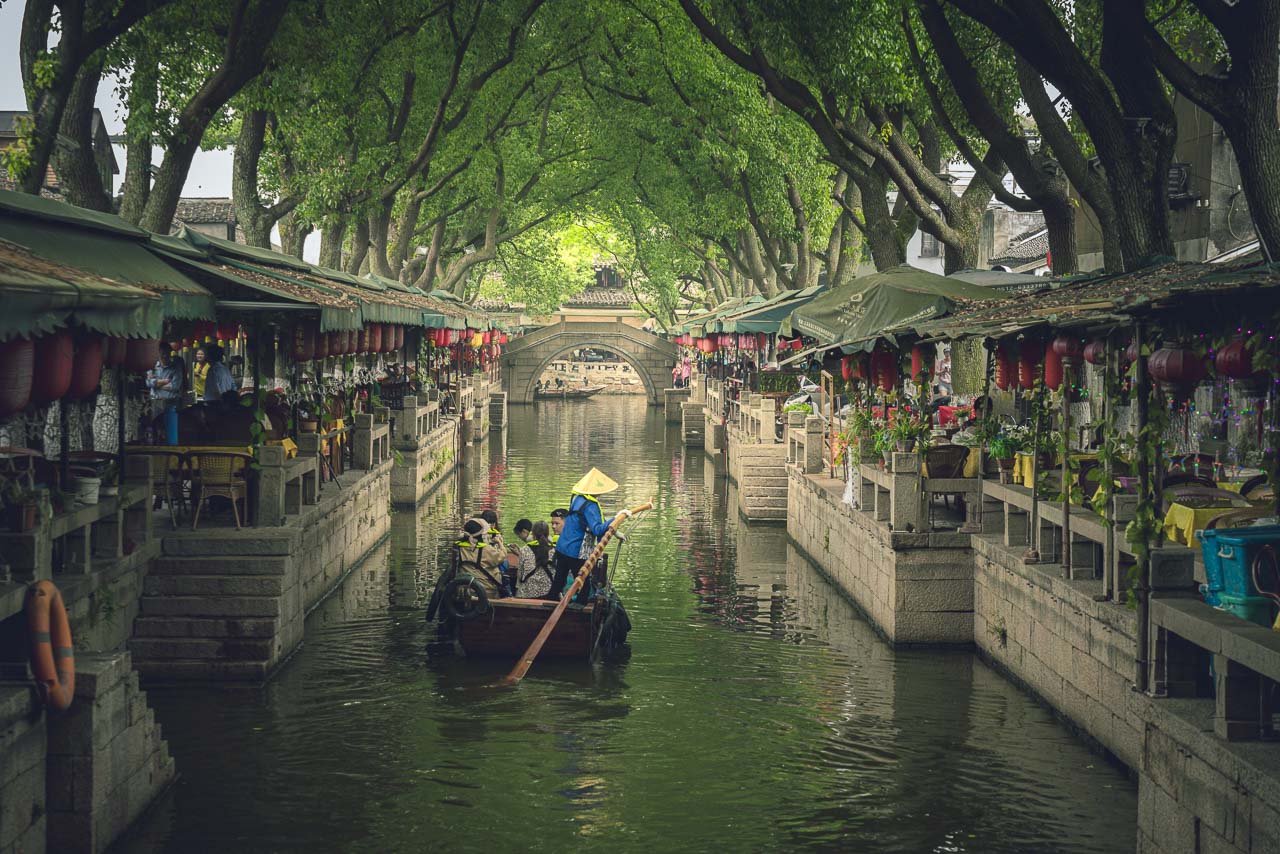
Suzhou is known as the Venice of the East, but Tonglin Watertown truly lives up to it. The Suzhou Silk Museum, the first museum dedicated to silk in China, showcases exhibitions on China’s 7000 years’ silk history, traditional silk-weaving skills, and silk garments.
Just a one-hour drive from Suzhou, this lovely town is the perfect place to get on a canal and take in the sights. Tongli is one of six ancient towns south of the Yangtze River, and it can even be reached by Shanghai public transit.
Like Suzhou, it has a classical Chinese garden to explore, there are canals running through the town and pedestrian streets crossing over ancient bridges to wander. One of the most photogenic stops was on the canal tour when we passed a boat filled with large blackbirds. I think this is one of the most recognizable scenes of Tongli.
24. Visit Zhouzhuang Water Town
Zhouzhuang is one of the most famous water towns in China, known for its well-preserved ancient architecture and layout, offering a glimpse into China’s rich history and culture.
The town is renowned for its beautiful waterways, ancient stone bridges, and traditional houses. Key attractions include the Twin Bridges, Shen House, Zhang House, and Milou Tower. These structures provide insight into ancient Chinese architecture and the lifestyles of historical periods.
Situated near Suzhou, Zhouzhuang is easily accessible, making it a convenient day trip for tourists exploring the Suzhou area.
25. No 1. Silk factory
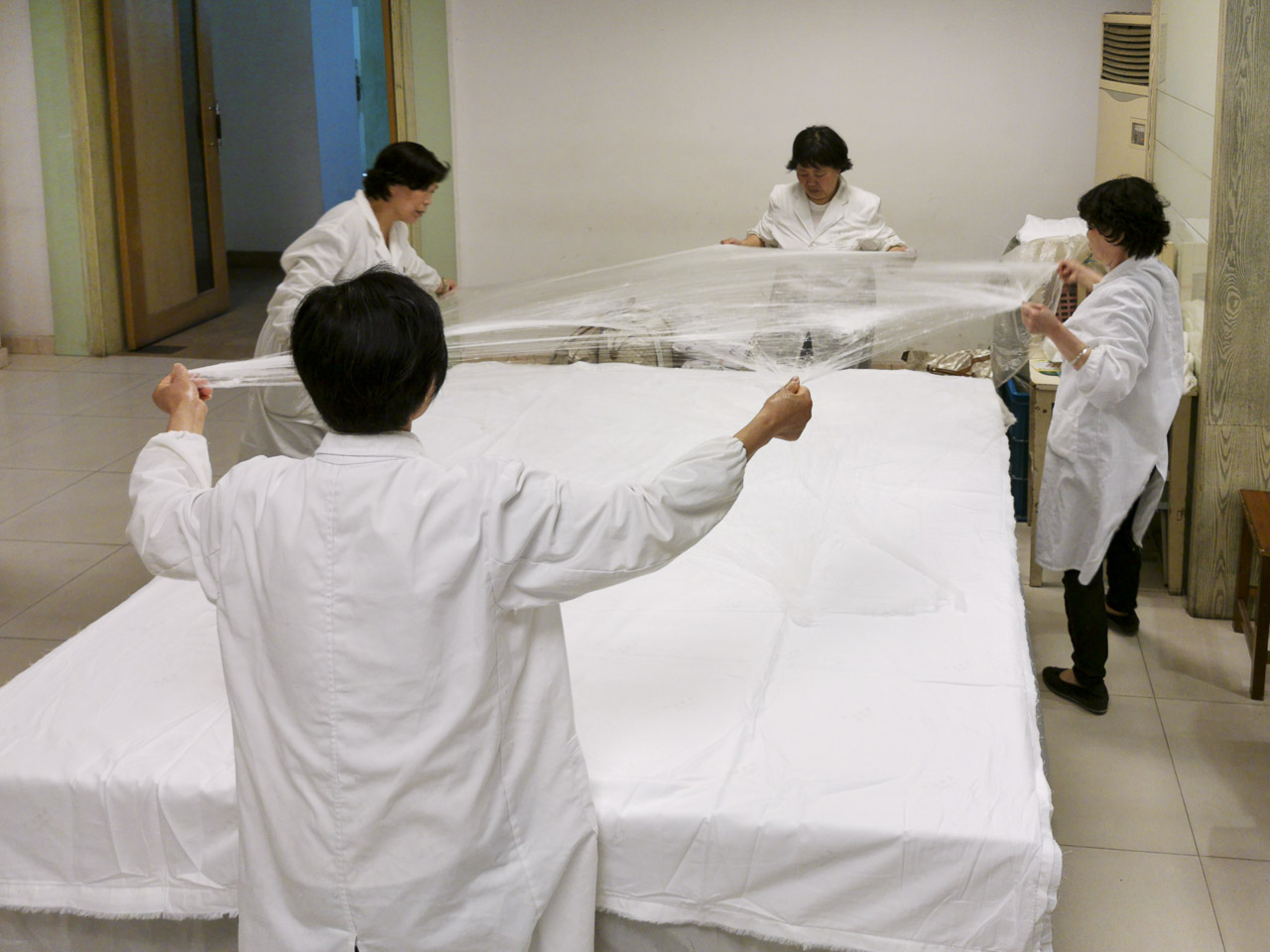
Silk production is a major industry in Suzhou. In fact, students learn how to take care of silkworms in school here. Part of their curriculum is to take home and raise silkworms properly.
I can’t believe that Dave and I have never visited a silk factory before in all our travels. I was captivated by the process. The silk industry in China dates back to 8500 years!
Silkworms are reared at the factory where they are given plenty of mulberry leaves to munch on before they See from the worms to the silk-making, boiling and threading.
One cocoon can create one kilometer of thread! Before the cocoon is finished, it is boiled and killed within its safe haven before it can hatch. A handful of dead cocoons are then placed in a threading machine where the strands of silk are woven together making a strong fabric.
This process has been used for thousands of years. The only thing that has changed is the technology, but the worms do all the work.
26. Wedding dress capital of the world
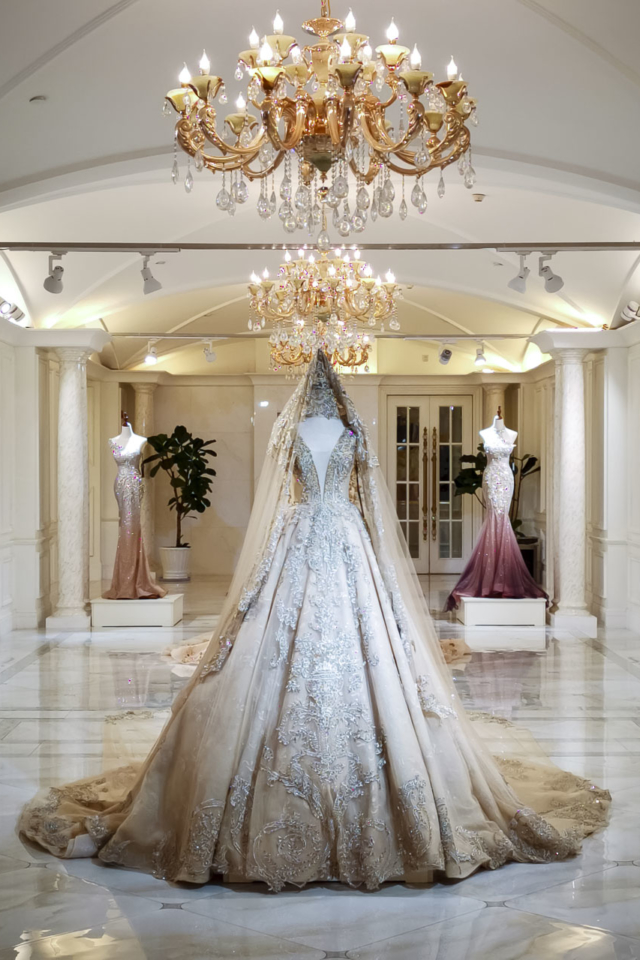
Being a huge producer of silk, it is no wonder that Suzhou is the wedding dress capital of the world. They have an entire street dedicated to wedding dresses.
When Dave and I heard this, we weren’t too keen to visit a wedding dress market, but after visiting the factory and learning of how huge the industry was, we were game to find out more.
We had the opportunity to visit the largest supplier of wedding dresses – Jusere – in China and they had an incredible display. Not only did they have wedding dresses, but they also had a private room where they dressed as movie stars and dignitaries.
People fly from all around the world to have dresses made here. Even if you aren’t into big fancy weddings, the wedding dress market or a factory tour is an interesting excursion in Suzhou.
27. Embroidery Institute
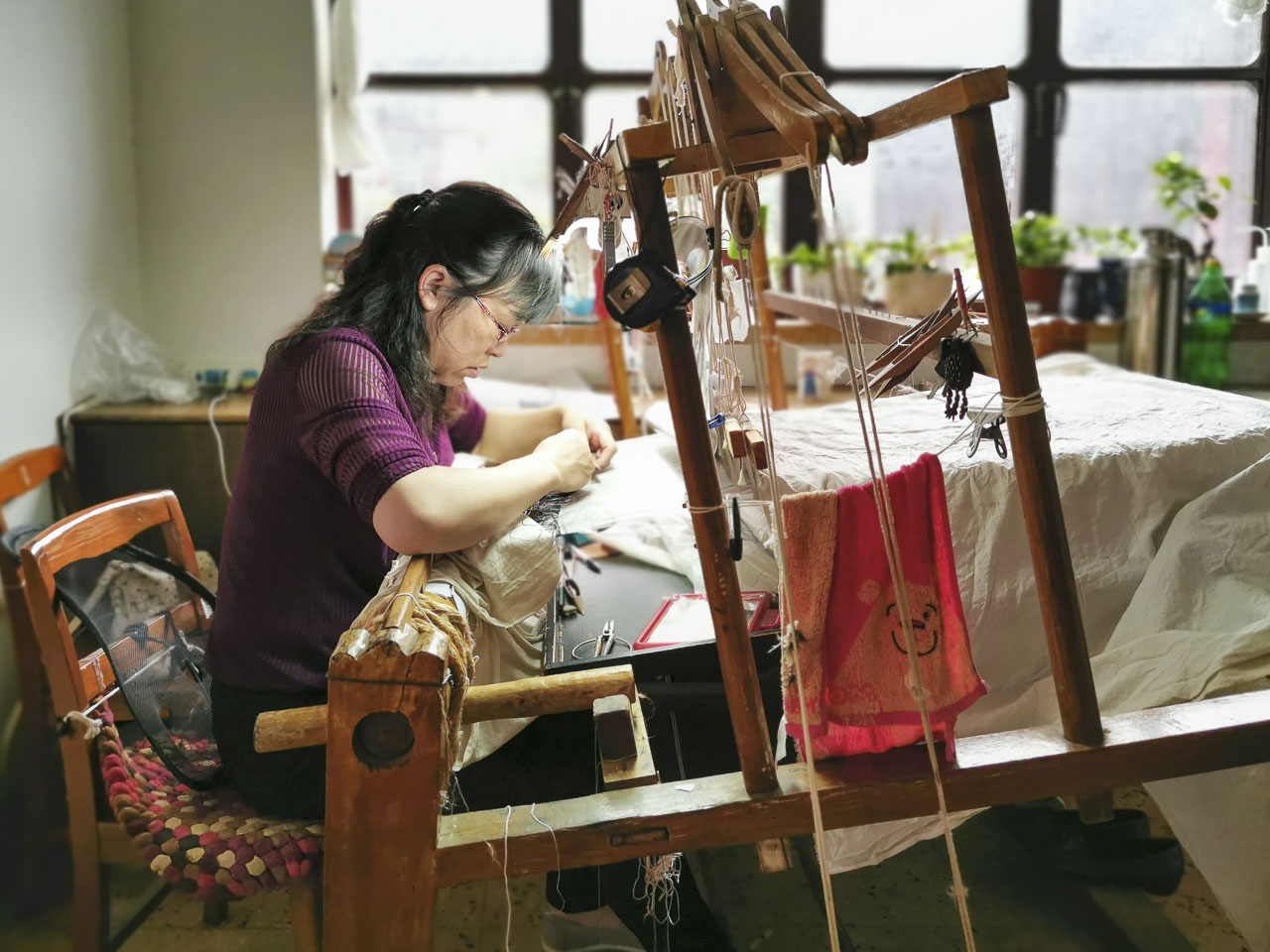
The final stop for artistry was the Embroidery Institute, located near the Master of the Nets Garden. Somebody has to have the skills to decorate those beautiful dresses.
Embroidery artists are another revered job in Suzhou and women work on intricate patterns with swaths of thread to create embroidery art and clothing. The work is so difficult that they have to take regular breaks to meditate in the garden.
You must have young eyes to be an embroidery artist, I couldn’t even see the eye of the needle when they showed me how they thread it.
28. Master of the Nets Show
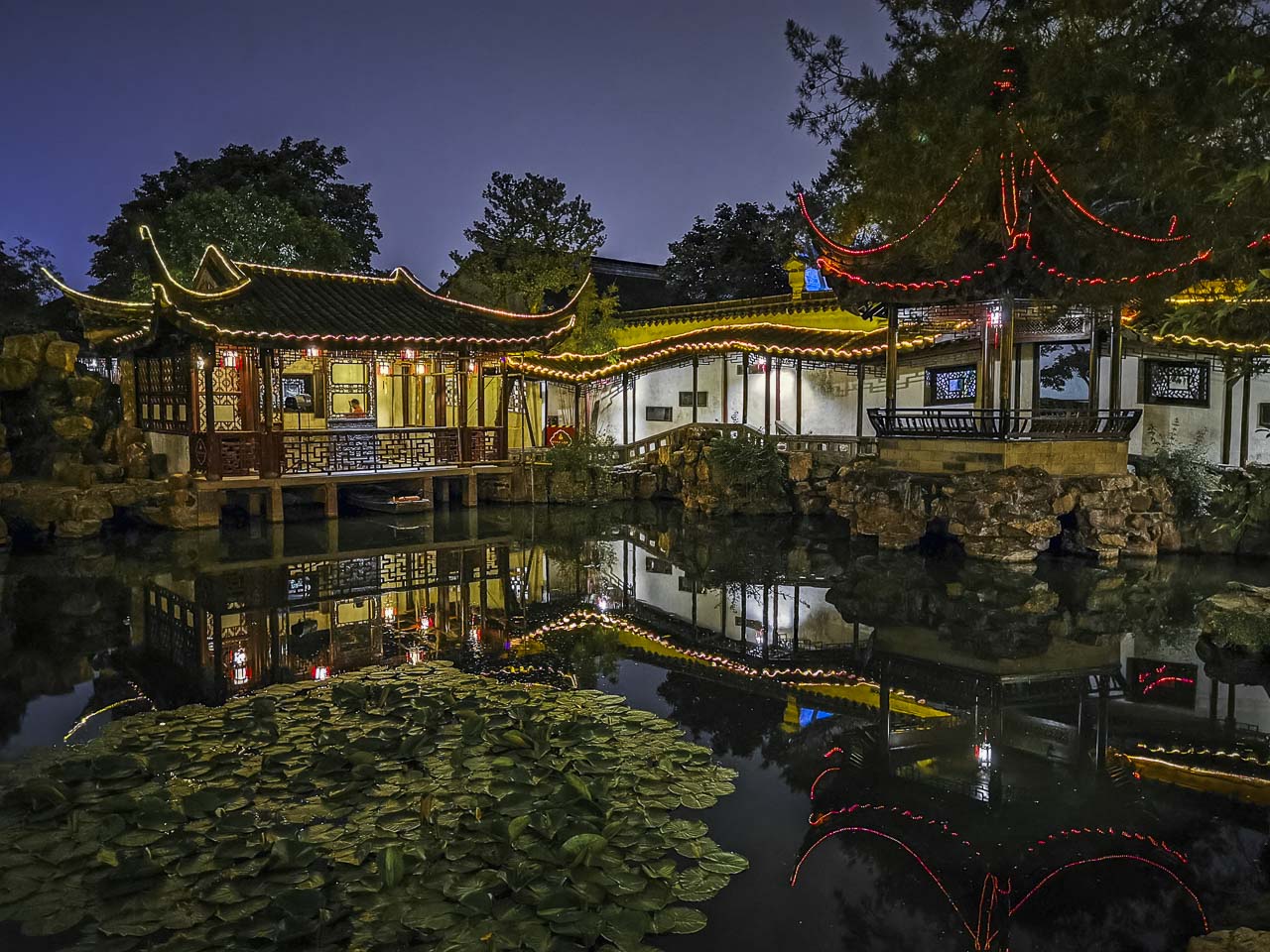
Our final evening in Suzhou ended with one of the top things to do in Suzhou, according to other websites.
I found this funny and realized that many people probably didn’t bother doing this; they probably just read about it on another website and put it in their posts. Ah, the Internet. But the garden itself is considered one of the finest in Suzhou, so you should see it.
The Master of the Nets show is a kitschy performance of traditional Chinese music, folklore, and poetry. We couldn’t understand a thing, and the crowd moved from one room to another through the gardens.
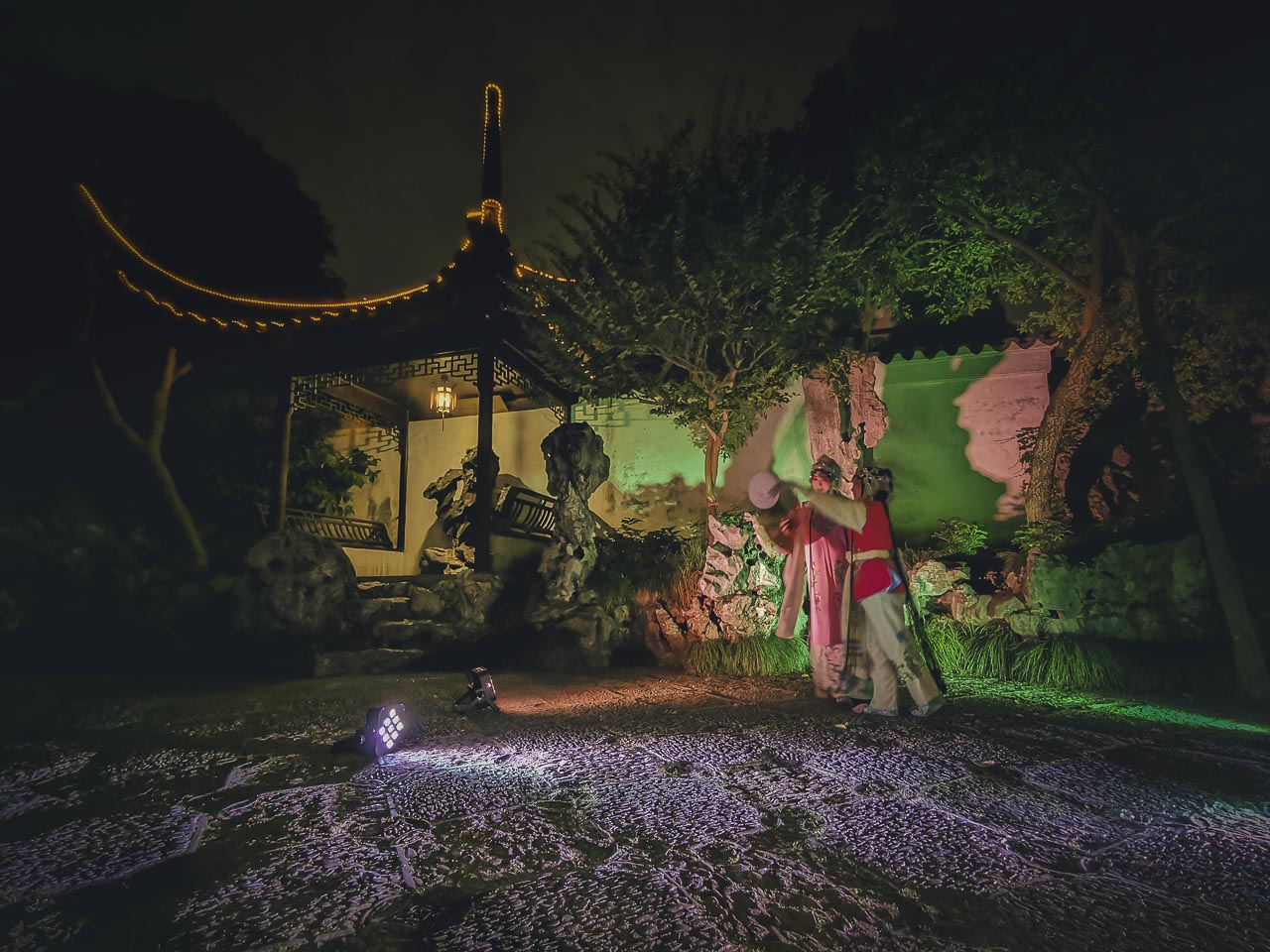
It was a pretty display as it was lit up with colorful lights, but it definitely wasn’t a mindblowing cultural performance.
The musicians seemed bored, and the performers seemed like amateurs. Clearly, every package tour goes to this, so chances are, if you are on an organized trip through Suzhou, you will be seeing the Master of Nets.
The best advice I can give you is to run ahead of the crowd after each short performance so that you can get a seat at the next stop. They pack people in!
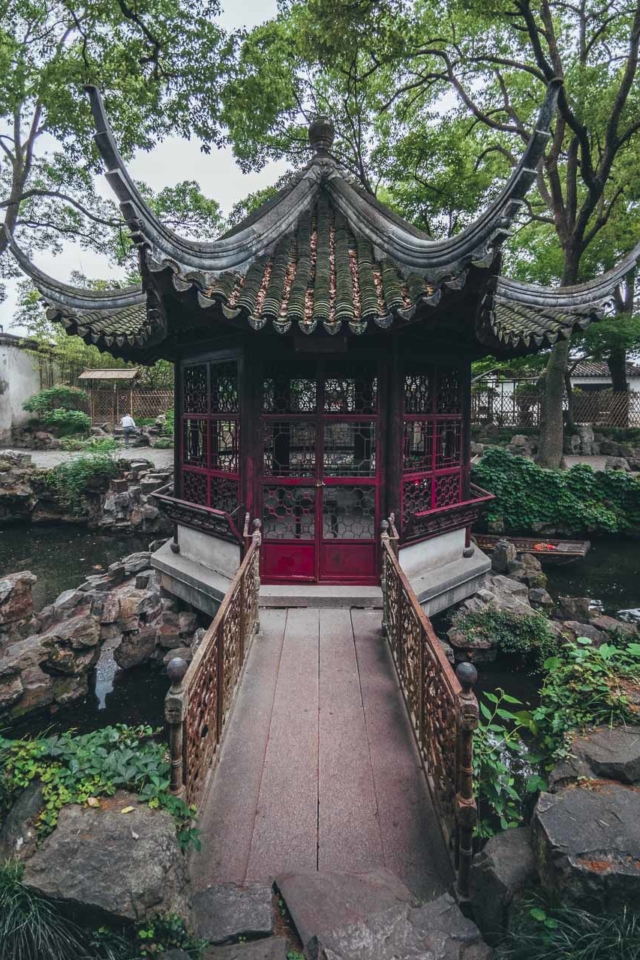
Suzhou is an amazing destination in China. I can see it becoming a larger stop on people’s China itinerary and soon, it won’t be just Chinese tourists exploring the gardens and Canals.
How to Get to Suzhou
Getting to Suzhou by train is easy and convenient.
From Shanghai, you can take a high-speed train from either Shanghai Hongqiao Railway Station or Shanghai Railway Station. The journey takes about 25-30 minutes, with frequent departures throughout the day. Upon arrival at Suzhou Railway Station, you can easily access the city’s attractions via taxi, bus, or metro.
For those traveling from Beijing, high-speed trains from Beijing South Railway Station reach Suzhou in about 4.5 hours
Many China tours include Suzhou tours in their itineraries and for good reason. From the performers of the Kunqu Opera, to its rich chinese culture dating back to ancient times, Suzhou has many treasures that can keep you occupited for days.. Make sure to add it to your itinerary too!
Whether you are a fan of traditional or modern China, Suzhou has it all. I would rank the city right up there with Shanghai, Hong Kong, and Beijing as a must-visit urban center of the country.

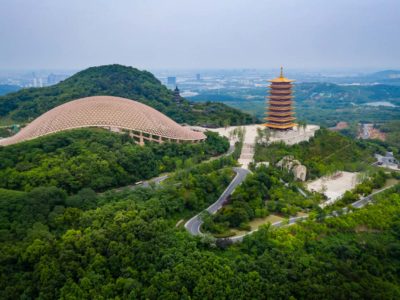
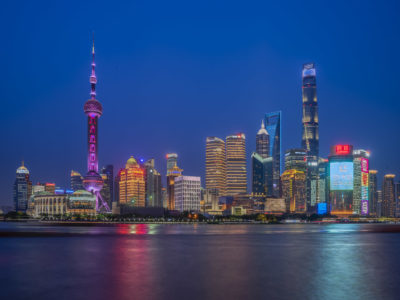
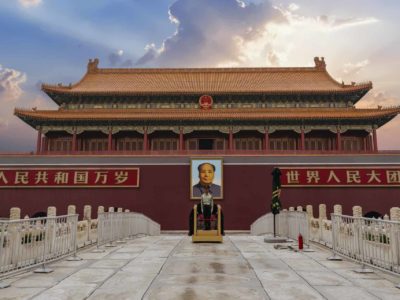
Suzhou, a paradise-like city with fast growing opportunities, is worth to visit and live!
I Like The Embroidery Section And There Idea Of Having young persons For This Work.
And I Love the Pictures You Shared.
wow .. it’s fun, of course, to travel the world like you
I really like the beautiful pictures. After reading this i really want to visit china now
One of the best places to live and work in China. I couldn’t recommend it enough
Hello, great blog. I just had a que about your trip to suzhou?
How did you guys managed to go to top of HOTEL W? I heard there is a coffee shop?
Suzhou, an over 2500 years old historical and cultural city, is famous for many elegant ancient gardens not seen anywhere else. Our well planned Suzhou tours will give you a greater insight into the city s unique landscape, architectural splendours and rich culture.
Suzhou China is really a memorable place to visit. Thank you for this article.
You guys were able to hit up pretty much all of the “good” places and even got in some interesting cultural experiences! I lived in Suzhou for a short time and those were all the highlights I wanted to see. So glad you got to experience a city another foreigner got to experience. Suzhou really is a city that is often overlooked in China, but I loved the beautiful waterways.
I think it’s becoming more and more popular. Foreigners coming to China are increasingly past Shanghai and Beijing and towards Hangzhou and Suzhou. Beautiful and more chilled cities, even if they are still HUGE by our standards
Wow! I will admit that I have never had a lot of interest in visiting China–until now. Suzhou sounds amazing and I’m adding it to my wish list. Thank you! 🙂
Hopefully I get to travel out of the country someday and expand my mind. Would love someday to see what other countries are like being there. 🙂
Ah, i love your blog, its always fun for me to see what you think we should visit! And I love all the photos.